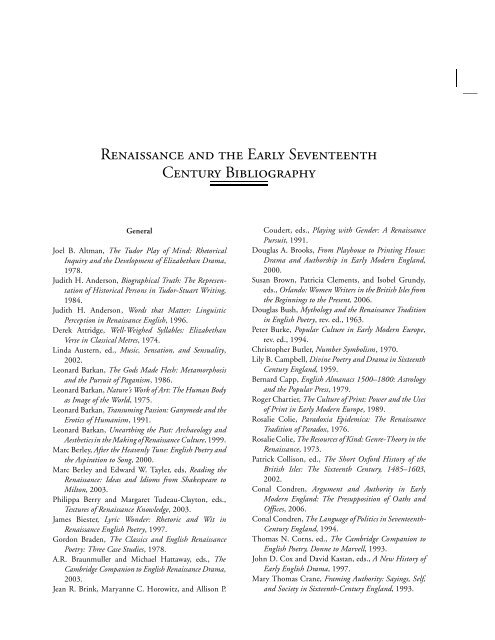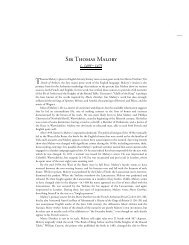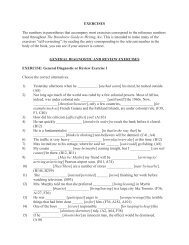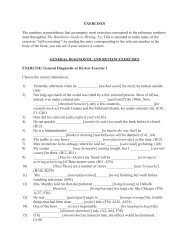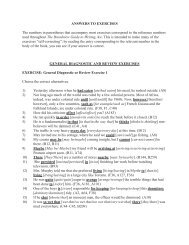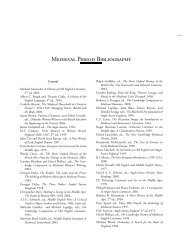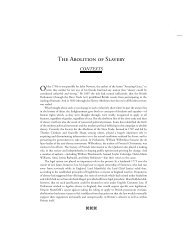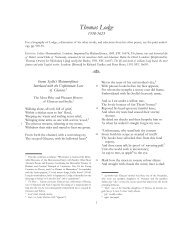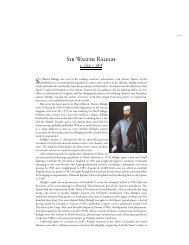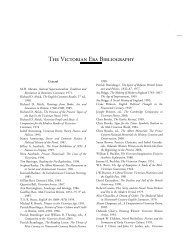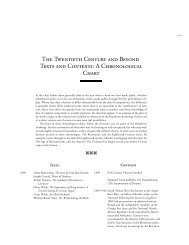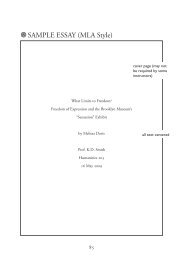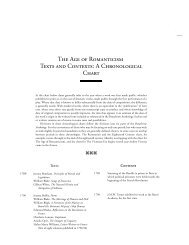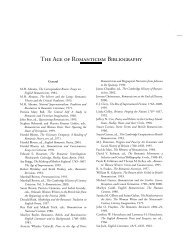Concise Edition Bibliography - Broadview Press Publisher's Blog
Concise Edition Bibliography - Broadview Press Publisher's Blog
Concise Edition Bibliography - Broadview Press Publisher's Blog
Create successful ePaper yourself
Turn your PDF publications into a flip-book with our unique Google optimized e-Paper software.
Renaissance and the Early Seventeenth<br />
Century <strong>Bibliography</strong><br />
General<br />
Joel B. Altman, The Tudor Play of Mind: Rhetorical<br />
Inquiry and the Development of Elizabethan Drama,<br />
1978.<br />
Judith H. Anderson, Biographical Truth: The Representation<br />
of Historical Persons in Tudor-Stuart Writing,<br />
1984.<br />
Judith H. Anderson, Words that Matter: Linguistic<br />
Perception in Renaissance English, 1996.<br />
Derek Attridge, Well-Weighed Syllables: Elizabethan<br />
Verse in Classical Metres, 1974.<br />
Linda Austern, ed., Music, Sensation, and Sensuality,<br />
2002.<br />
Leonard Barkan, The Gods Made Flesh: Metamorphosis<br />
and the Pursuit of Paganism, 1986.<br />
Leonard Barkan, Nature’s Work of Art: The Human Body<br />
as Image of the World, 1975.<br />
Leonard Barkan, Transuming Passion: Ganymede and the<br />
Erotics of Humanism, 1991.<br />
Leonard Barkan, Unearthing the Past: Archaeology and<br />
Aesthetics in the Making of Renaissance Culture, 1999.<br />
Marc Berley, After the Heavenly Tune: English Poetry and<br />
the Aspiration to Song, 2000.<br />
Marc Berley and Edward W. Tayler, eds, Reading the<br />
Renaissance: Ideas and Idioms from Shakespeare to<br />
Milton, 2003.<br />
Philippa Berry and Margaret Tudeau-Clayton, eds.,<br />
Textures of Renaissance Knowledge, 2003.<br />
James Biester, Lyric Wonder: Rhetoric and Wit in<br />
Renaissance English Poetry, 1997.<br />
Gordon Braden, The Classics and English Renaissance<br />
Poetry: Three Case Studies, 1978.<br />
A.R. Braunmuller and Michael Hattaway, eds., The<br />
Cambridge Companion to English Renaissance Drama,<br />
2003.<br />
Jean R. Brink, Maryanne C. Horowitz, and Allison P.<br />
Coudert, eds., Playing with Gender: A Renaissance<br />
Pursuit, 1991.<br />
Douglas A. Brooks, From Playhouse to Printing House:<br />
Drama and Authorship in Early Modern England,<br />
2000.<br />
Susan Brown, Patricia Clements, and Isobel Grundy,<br />
eds., Orlando: Women Writers in the British Isles from<br />
the Beginnings to the Present, 2006.<br />
Douglas Bush, Mythology and the Renaissance Tradition<br />
in English Poetry, rev. ed., 1963.<br />
Peter Burke, Popular Culture in Early Modern Europe,<br />
rev. ed., 1994.<br />
Christopher Butler, Number Symbolism, 1970.<br />
Lily B. Campbell, Divine Poetry and Drama in Sixteenth<br />
Century England, 1959.<br />
Bernard Capp, English Almanacs 1500–1800: Astrology<br />
and the Popular <strong>Press</strong>, 1979.<br />
Roger Chartier, The Culture of Print: Power and the Uses<br />
of Print in Early Modern Europe, 1989.<br />
Rosalie Colie, Paradoxia Epidemica: The Renaissance<br />
Tradition of Paradox, 1976.<br />
Rosalie Colie, The Resources of Kind: Genre-Theory in the<br />
Renaissance, 1973.<br />
Patrick Collison, ed., The Short Oxford History of the<br />
British Isles: The Sixteenth Century, 1485–1603,<br />
2002.<br />
Conal Condren, Argument and Authority in Early<br />
Modern England: The Presupposition of Oaths and<br />
Offices, 2006.<br />
Conal Condren, The Language of Politics in Seventeenth-<br />
Century England, 1994.<br />
Thomas N. Corns, ed., The Cambridge Companion to<br />
English Poetry, Donne to Marvell, 1993.<br />
John D. Cox and David Kastan, eds., A New History of<br />
Early English Drama, 1997.<br />
Mary Thomas Crane, Framing Authority: Sayings, Self,<br />
and Society in Sixteenth-Century England, 1993.
2 <strong>Broadview</strong> Anthology of British Literature<br />
David Cressy, Birth, Marriage, and Death: Ritual,<br />
Religion, and the Life-Cycle in Tudor and Stuart<br />
England, 1997.<br />
David Cressy, Education in Tudor and Stuart England,<br />
1975.<br />
David Cressy, Literacy and the Social Order: Reading and<br />
Writing in Tudor and Stuart England, 1980.<br />
David Cressy, Travesties and Transgressions in Tudor and<br />
Stuart England: Tales of Discord and Dissension,<br />
2000.<br />
Jonathan V. Crewe, Trials of Authorship: Anterior Forms<br />
and Poetic Reconstruction from Wyatt to Shakespeare,<br />
1990.<br />
Lorraine Daston and Katharine Park, Wonders and the<br />
Order of Nature, 1150–1750, 1998.<br />
Lloyd Davis, ed., Sexuality and Gender in the English<br />
Renaissance: An Annotated <strong>Edition</strong> of Contemporary<br />
Documents, 1998.<br />
Walter Davis, Idea and Act in Elizabethan Fiction, 1969.<br />
Allan G. Debus and Michael T. Walton, eds., Reading<br />
the Book of Nature: The Other Side of the Scientific<br />
Revolution, 1998.<br />
Huston Diehl, Staging Reform, Reforming the Stage:<br />
Protestantism and Popular Theater in Early Modern<br />
England, 1997.<br />
Mario DiGangi, The Homoerotics of Early Modern<br />
Drama, 1997.<br />
Stephen B. Dobranski, Readers and Authorship in Early<br />
Modern England, 2005.<br />
Madeleine Doran, Endeavors of Art: A Study of Form in<br />
Elizabethan Drama, 1964.<br />
Elizabeth L. Eisenstein, The Printing <strong>Press</strong> as Agent of<br />
Change: Communications and Cultural Transformations<br />
in Early Modern Europe, 1979.<br />
Elizabeth L. Eisenstein, The Printing Revolution in Early<br />
Modern Europe, 2005.<br />
Norbert Elias, The Civilizing Process: The History of<br />
Manners, 1982.<br />
Peter Erickson and Clark Hulse, eds., Early Modern<br />
Visual Culture: Representation, Race, and Empire in<br />
Renaissance England, 2000.<br />
Andrew Escobedo, Nationalism and Historical Loss in<br />
Renaissance England: Foxe, Dee, Spenser, Milton,<br />
2004.<br />
David Evett, Literature and the Visual Arts in Tudor<br />
England, 1990.<br />
Margaret W. Ferguson, Maureen Quilligan, and Nancy<br />
Vickers, eds., Rewriting the Renaissance: The<br />
Discources of Sexual Difference in Early Modern<br />
Europe, 1986.<br />
Daniel Fischlin, In Small Proportions: A Poetics of the<br />
English Ayre 1596–1622, 1998.<br />
Stanley Fish, Self-Consuming Artifacts: The Experience of<br />
Seventeenth-Century Literature, 1972.<br />
Stanley Fish, ed., Seventeenth-Century Prose: Modern<br />
Essays in Criticism, 1971.<br />
Rosemary Freeman, English Emblem Books, 1948.<br />
Patricia Fumerton, Cultural Aesthetics: Renaissance<br />
Literature and the Practice of Social Ornament, 1991.<br />
Jonathan Goldberg, Queering the Renaissance, 1994.<br />
Jonathan Goldberg, Sodometries: Renaissance Texts,<br />
Modern Sexualities, 1992.<br />
Stephen Greenblatt, Renaissance Self-Fashioning: From<br />
More to Shakespeare, 2005.<br />
Stephen Greenblatt, Shakespearean Negotiations: The<br />
Circulation of Social Energy in Renaissance England,<br />
1988.<br />
Stephen Greenblatt, ed., Representing the English Renaissance,<br />
1988.<br />
Thomas M. Greene, The Light in Troy: Imitation and<br />
Discovery in Renaissance Poetry, 1982.<br />
Achsah Guibbory, The Map of Time: Seventeenth-<br />
Century English Literature and Ideas of Pattern in<br />
History, 1986.<br />
John Guy, Tudor England, 1988.<br />
Stephen Guy-Bray, Homoerotic Space: The Poetics of Loss<br />
in Renaissance Literature, 2002.<br />
Heidi Brayman Hackel, Reading Material in Early<br />
Modern England: Print, Gender, and Literacy, 2005.<br />
Andrew Hadfield, The English Renaissance, 1500–1620,<br />
2000.<br />
Richard Halpern, Poetics of Primitive Accumulation:<br />
English Renaissance Culture and the Genealogy of<br />
Capital, 1991.<br />
O.B. Hardison, Prosody and Purpose in the English<br />
Renaissance, 1989.<br />
Richard Helgerson, The Elizabethan Prodigals, 1976.<br />
Richard Helgerson, Forms of Nationhood: The Elizabethan<br />
Writing of England, 1992.<br />
Richard Helgerson, Self-Crowned Laureates: Spenser,
Jonson, Milton, and the Literary System, 1983.<br />
Margo Hendricks and Patricia Parker, eds., Women,<br />
“Race,” and Writing in the Early Modern Period, 1994.<br />
S.K. Heninger, The Cosmological Glass: Renaissance<br />
Diagrams of the Universe, 1977.<br />
S.K. Heninger, Touches of Sweet Harmony: Pythagorean<br />
Cosmology and Renaissance Poetics, 1974.<br />
Sandra Hindman, Printing the Written Word: The Social<br />
History of Books, circa 1450–1520, 1991.<br />
Jean Howard, The Stage and Social Struggle in Early<br />
Modern England, 1994.<br />
Clark Hulse, Metaphoric Verse: The Elizabethan Minor<br />
Epic, 1981.<br />
Clark Hulse, The Rule of Art: Literature and Painting in<br />
the Renaissance, 1990.<br />
John Huntington, Ambition, Rank, and Poetry in 1590s<br />
England, 2001.<br />
David Kastan, ed., Oxford Encyclopedia of British<br />
Literature, 2006.<br />
David Kastan and Peter Stallybrass, eds., Staging the<br />
Renaissance: Essays on Elizabethan and Jacobean<br />
Drama, 1991.<br />
Donald R. Kelley and David H. Sacks, eds., The<br />
Historical Imagination in Early Modern Britain:<br />
History, Rhetoric, and Fiction, 1500–1800, 1997.<br />
John N. King, English Reformation Literature: The<br />
Tudor Origins of the Protestant Tradition, 1982.<br />
John N. King, ed., Voices of the English Reformation: A<br />
Sourcebook, 2004.<br />
Arthur F. Kinney, ed., The Cambridge Companion to<br />
English Literature 1500–1600, 2000.<br />
Arthur F. Kinney, ed., A Companion to Renaissance<br />
Drama, 2002.<br />
Arthur F. Kinney and David W. Swain, eds., Tudor<br />
England: An Encyclopedia, 2001.<br />
Jill Kraye, ed., The Cambridge Companion to Renaissance<br />
Humanism, 1996.<br />
Thomas Laqueur, Making Sex: Body and Gender from<br />
the Greeks to Freud, 1990.<br />
Zachary Lesser, The Politics of Publication: The Never-<br />
Writers and Ever-Readers of Early Stuart Drama,<br />
2001.<br />
Joseph Levine, Humanism and History: Origins of<br />
Modern English Historiography, 1987.<br />
Barbara Lewalski, Protestant Poetics and the Seventeenth<br />
Renaissance and the Early Seventeenth Century <strong>Bibliography</strong> 3<br />
Century, 1979.<br />
Fritz Levy, Tudor Historical Thought, 1967.<br />
Joseph Loewenstein, The Author’s Due: Printing and the<br />
Prehistory of Copyright, 2002.<br />
George M. Logan and Gordon Teskey, eds., Unfolded<br />
Tales: Essays on Renaissance Romance, 1989.<br />
Lawrence Manley, Convention: 1500–1750, 1980.<br />
Lawrence Manley, Literature and Culture in Early<br />
Modern London, 2005.<br />
Katharine Maus, Inwardness and Theater in the English<br />
Renaissance, 1995.<br />
Carla Mazzio, ed., The Body in Parts: Fantasies of<br />
Corporeality in Early Modern Europe, 1997.<br />
Diane Kelsey McColley, Poetry and Music in<br />
Seventeenth-Century England, 1997.<br />
Naomi J. Miller and Naomi Yavneh, eds., Maternal<br />
Measures: Figuring Caregiving in the Early Modern<br />
Period, 2000.<br />
Louis Montrose, The Purpose of Playing: Shakespeare and<br />
the Cultural Politics of the Elizabethan Theatre, 1996.<br />
John Morrill, ed., The Oxford Illustrated History of<br />
Tudor and Stuart Britain, 1996.<br />
John Morrill, ed., Reactions to the English Civil War,<br />
1642–1649, 1984.<br />
Ian F. Moulton, Before Pornography: Explicitly Erotic<br />
Writing in Early Modern England, 1995.<br />
Marjorie Hope Nicolson, The Breaking of the Circle:<br />
Studies in the Effect of the “New Science” Upon<br />
Seventeenth-Century Poetry, rev. ed., 1962.<br />
Marcy L. North, The Anonymous Renaissance: Cultures<br />
of Discretion in Tudor-Stuart England, 2003.<br />
Glyn P. Norton, ed., The Cambridge History of Literary<br />
Criticism: The Renaissance, 1999.<br />
Stephen Orgel, Impersonations: The Performance of<br />
Gender in Shakespeare’s England, 1996.<br />
Stephen Orgel, The Illusion of Power: Political Theater in<br />
the English Renaissance, 1975.<br />
Patricia A. Parker, Inescapable Romance: Studies in the<br />
Poetics of a Mode, 1979.<br />
Gail Kern Paster, The Body Embarrassed: Drama and the<br />
Discipline of Shame in Early Modern England, 1993.<br />
Gail Kern Paster, Katherine Rowe, and Mary Floyd-<br />
Wilson, eds., Reading the Early Modern Passions:<br />
Essays in the Cultural History of Emotion, 2004.<br />
C.A. Patrides and Raymond B. Waddington, eds., The
4 <strong>Broadview</strong> Anthology of British Literature<br />
Age of Milton: Backgrounds to Seventeenth-Century<br />
Literature, 1980.<br />
Annabel Patterson, Censorship and Interpretation: The<br />
Conditions of Writing and Reading in Early Modern<br />
England, 1984.<br />
Annabel Patterson, ed., Early Modern Liberalism, 2006.<br />
Annabel Patterson, ed., Early Modern Reader: Literature<br />
and Religion—1530–1681, vol. 1, 2007.<br />
Peter G. Platt, ed., Wonders, Marvels, and Monsters in<br />
Early Modern Culture, 1999.<br />
Heinrich F. Plett, Rhetoric and Renaissance Culture,<br />
2004.<br />
Robert Poole, Time’s Alteration: Calendar Reform in<br />
Early Modern England, 1998.<br />
David Quint, Epic and Empire: Politics and Generic<br />
Form from Virgil to Milton, 1993.<br />
David Quint, Origin and Originality in Renaissance<br />
Literature: Versions of the Source, 1983.<br />
Anne Lake Prescott, French Poets and the English<br />
Renaissance: Studies in Fame and Transformation,<br />
1978.<br />
Maureen Quilligan, Incest and Agency in Elizabeth’s<br />
England, 2005.<br />
Neil Rhodes and Jonathan Sawday, eds., The<br />
Renaissance Computer: Knowledge Technology in the<br />
First Age of Print, 2000.<br />
Jasper Ridley, The Tudor Age, 1988.<br />
Jonathan Sawday, The Body Emblazoned: Dissection and<br />
the Human Body in Renaissance Culture, 1996<br />
Winfried Schleiner, Medical Ethics in the Renaissance,<br />
1995.<br />
Michael C. Schoenfeldt, Bodies and Selves in Early<br />
Modern England: Physiology and Inwardness in Early<br />
Modern England, 1999.<br />
Jean Seznec, The Survival of the Pagan Gods: The<br />
Mythological Tradition and its Place in Renaissance<br />
Humanism and Art, trans. Barbara F. Sessions, 1953.<br />
Kevin Sharpe and Steven N. Zwicker, eds., Politics of<br />
Discourse: The Literature and History of Seventeenth-<br />
Century England, 1987.<br />
Debora K. Shuger, Censorship and Cultural Sensibility:<br />
The Regulation of Language in Tudor-Stuart England,<br />
2005.<br />
Debora K. Shuger, The Renaissance Bible: Scholarship,<br />
Sacrifice, and Subjectivity, 1994.<br />
Wayne Shumaker, The Occult Sciences in the Renaissance:<br />
A Study in Intellectual Patterns, 1972.<br />
Peter Stallybrass and Allon White, The Politics and<br />
Poetics of Transgression, 1986.<br />
Alan Stewart and Heather Wolfe, Letterwriting in<br />
Renaissance England, 2004.<br />
Lawrence Stone, The Causes of the English Revolution,<br />
1529–1642, 1972.<br />
Lawrence Stone, The Family, Sex and Marriage in<br />
England, 1500–1800, 1979.<br />
Lawrence Stone, Social Change and Revolution in<br />
England, 1540–1640, 1970.<br />
Roy C. Strong, The Cult of Elizabeth: Elizabethan<br />
Portraiture and Pageantry, 1977.<br />
Roy C. Strong, Splendor at Court: Renaissance Spectacle<br />
and the Theater of Power, 1973.<br />
Margorie Swan, Curiosities and Texts: The Culture of<br />
Collecting in Early Modern England, 2001.<br />
Gordon Teskey, Allegory and Violence, 1996.<br />
Keith Thomas, Man and the Natural World: Changing<br />
Attitudes in England 1500–1800, 1996.<br />
Keith Thomas, Religion and the Decline of Magic, 1971.<br />
Wendy Wall, The Imprint of Gender: Authorship and<br />
Publication in the English Renaissance, 1993.<br />
Wendy Wall, Staging Domesticity: Household Work and<br />
English Identity in Early Modern Drama, 2002.<br />
Robin Headlam Wells, Elizabethan Mythologies: Studies<br />
in Poetry, Drama, and Music, 1994.<br />
Helen Wilcox, ed., Women and Literature in Britain,<br />
1500–1700, 1996.<br />
Deanne Williams, The French Fetish from Chaucer to<br />
Shakespeare, 2004.<br />
Edgar Wind, Pagan Mysteries in the Renaissance, rev. ed.,<br />
1980.<br />
Jessica Wolfe, Humanism, Machinery and Renaissance<br />
Literature, 2004.<br />
D.R. Woolf, The Idea of History in Early Stuart England,<br />
1990.<br />
Frances A. Yates, Astraea: The Imperial Theme in the<br />
Sixteenth Century, 1975.<br />
Frances A. Yates, The Art of Memory, new ed., 1992.<br />
Frances A. Yates, The Occult Philosophy in the Elizabethan<br />
Age, 1979.
Francis Bacon<br />
Texts: A variety of editions have been consulted.<br />
Spelling and punctuation have been modernized in<br />
accordance with the practice of the anthology.<br />
<strong>Edition</strong>s:<br />
Susan Bruce, ed., Three Early Modern Utopias: Thomas<br />
More, Utopia, Francis Bacon, New Atlantis, and<br />
Henry Neville, Isle of Pines, 2000.<br />
Robert Leslie Ellis, James Spedding, and Douglas Denon<br />
Heath, eds., The Works of Francis Bacon, 14 vols.,<br />
1858–1874.<br />
Arthur J. Johnston, ed., The Advancement of Learning<br />
and New Atlantis, 1974.<br />
Richard Foster Jones, ed., Francis Bacon: Essays,<br />
Advancement of Learning, New Atlantis, and Other<br />
Pieces, 1937.<br />
Michael Kiernan, ed. The Advancement of Learning,<br />
2000.<br />
Michael Kiernan, ed., The Essayes or Counsels, 1985.<br />
John Pitcher, ed., The Essays, 1985.<br />
Brian Vickers, ed., The Major Works: Francis Bacon,<br />
2002.<br />
Sidney Warhaft, ed., Francis Bacon: A Selection of his<br />
Works, 1965.<br />
Biographies:<br />
Catherine Drinker Bowen, Francis Bacon: The Temper<br />
of a Man, 2 nd ed,. 1993.<br />
Daphne Du Maurier, Winding Stair: Francis Bacon, his<br />
Rise and Fall, 1976.<br />
Lisa Jardine and Alan Stewart, Hostage to Fortune: The<br />
Troubled Life of Francis Bacon, 1998.<br />
Criticism:<br />
John C. Briggs, Francis Bacon and the Rhetoric of<br />
Nature, 1989.<br />
Stephen Gaukroger, Francis Bacon and the Transformation<br />
of Early-Modern Philosophy, 2001.<br />
Lisa Jardine, Francis Bacon: Discovery and the Art of<br />
Discourse, 1974.<br />
Stephen A. McKnight, The Religious Foundations of<br />
Francis Bacon’s Thought, 2006.<br />
Renaissance and the Early Seventeenth Century <strong>Bibliography</strong> 5<br />
Markku Peltonen, ed., The Cambridge Companion to<br />
Bacon, 1996.<br />
Bronwen Price, ed., Francis Bacon’s New Atlantis: New<br />
Interdisciplinary Essays, 2002<br />
William A. Sessions, ed., Francis Bacon's Legacy of Texts,<br />
1990.<br />
Julie Robin Solomon and Catherine Gimelli Martin,<br />
eds., Francis Bacon and the Refiguring of Early<br />
Modern Thought: Essays to Commemorate the<br />
Advancement of Learning (1605–2005), 2005.<br />
Brian Vickers, Francis Bacon and Renaissance Prose, 1968.<br />
Peter Zagorin, Francis Bacon, 1998.<br />
Contexts: Culture: A Portfolio<br />
Heidi Hackel Brayman, Reading Material in Early<br />
Modern England: Print, Gender, and Literacy, 2005.<br />
Gillian E. Brennan, Patriotism, Power, and Print:<br />
National Consciousness in Tudor England, 2003.<br />
Katharine M. Briggs, The Anatomy of Puck: An Examination<br />
of Fairy Beliefs Among Shakespeare’s Contemporaries<br />
and Successors, 1959.<br />
Katharine M. Briggs, Pale Hecate’s Team: An<br />
Examination of the Beliefs on Witchcraft and Magic<br />
Among Shakespeare’s Contemporaries and his Immediate<br />
Successors, 1962.<br />
Michael Bristol, Carnival and Theater: Plebeian Culture<br />
and the Structure of Authority in Renaissance England,<br />
1989.<br />
Douglas A. Brooks, ed., Printing and Parenting in Early<br />
Modern England, 2005.<br />
Sandra Clark, Women and Crime in the Street Literature<br />
of Early Modern England, 2003.<br />
Cynthia Clegg, <strong>Press</strong> Censorship in Elizabethan England,<br />
1997.<br />
David Cressy, Birth, Marriage, and Death: Ritual,<br />
Religion, and the Life-Cycle in Tudor and Stuart<br />
England, 1997.<br />
David Cressy, Bonfires and Bells: National Memory and<br />
the Protestant Calendar in Elizabethan and Stuart<br />
England, 1989.<br />
Owen Davies, Cunning Folk: Popular Magic in English<br />
History, 2003.
6 <strong>Broadview</strong> Anthology of British Literature<br />
Frances Dolan, Dangerous Familiars: Representations of<br />
Domestic Crime in England 1550–1700, 1994.<br />
Martin Elsky, Authorizing Words: Speech, Writing, and<br />
Print in the English Renaissance, 1989.<br />
Peter Erickson and Clark Hulse, eds., Early Modern<br />
Visual Culture: Representation, Race, and Empire in<br />
Renaissance England, 2000.<br />
Margaret Ezell, Social Authorship and the Advent of<br />
Print, 1999.<br />
Boris Ford, ed., The Cambridge Cultural History of<br />
Britain: Seventeenth-Century Britain, 1992.<br />
Boris Ford, ed., The Cambridge Cultural History of<br />
Britain: Sixteenth-Century Britain, 1992.<br />
S.L. Greenslade, ed., The Cambridge History of the Bible,<br />
1963.<br />
Alexandra Halasz, The Marketplace of Print: Pamphlets<br />
and the Public Sphere in Early Modern England,<br />
1997.<br />
Kim Hall, Things of Darkness: Economies of Race and<br />
Gender in Early Modern England, 1995.<br />
John Hollander, The Untuning of the Sky: Ideas of Music<br />
in English Poetry, 1500–1700, 1961.<br />
Skiles Howard, The Politics of Courtly Dancing in Early<br />
Modern England, 1998.<br />
Linda Hults, The Witch as Muse: Art, Gender, and Power<br />
in Early Modern Europe, 2005.<br />
Ronald Hutton, The Rise and Fall of Merry England: The<br />
Ritual Year 1400–1700, 1994.<br />
Nathan Johnstone, The Devil and Demonism in Early<br />
Modern England, 2006.<br />
Ann Rosalind Jones and Peter Stallybrass, Renaissance<br />
Clothing and the Materials of Memory, 2000.<br />
Jenny Kermode and Garthine Walker, eds., Women,<br />
Crime and the Courts in Early Modern England,<br />
1994.<br />
Arthur F. Kinney, ed., Rogues, Vagabonds, and Sturdy<br />
Beggars: A New Gallery of Tudor and Early Stuart<br />
Rogue Literature Exposing the Lives, Times, and<br />
Cozening Tricks of the Elizabethan Underworld,<br />
1990.<br />
Suzanne Lord, Music from the Age of Shakespeare: A<br />
Cultural History, 2003.<br />
Leah S. Marcus, The Politics of Mirth: Jonson, Herrick,<br />
Milton, Marvell, and the Defense of Old Holiday<br />
Pastimes, 1986.<br />
Arthur F. Marotti and Michael D. Bristol, eds., Print,<br />
Manuscript, and Performance: The Changing Relations<br />
of the Media in Early Modern England, 2000.<br />
Claire McEachern and Debora Shuger, eds., Religion<br />
and Culture in Renaissance England, 1997.<br />
John S. Mebane, Renaissance Magic and the Return of the<br />
Golden Age: The Occult Tradition and Marlowe,<br />
Jonson, and Shakespeare, 1989.<br />
David Norton, A History of the Bible as Literature, 1993.<br />
Stephen Orgel and Roy Strong, eds., The Theatre of the<br />
Stuart Court; Including the Complete Designs for<br />
Productions at Court, for the Most Part in the<br />
Collection of the Duke of Devonshire, Together with<br />
their Texts and Historical Documentation, 1973.<br />
Robert Poole, The Lancashire Witches: Histories and<br />
Stories, 2002.<br />
Anne Lake Prescott, “Refusing Translation: The<br />
Gregorian Calendar and Early Modern English<br />
Writers,” The Yearbook of English Studies 36, 2006:<br />
1–11.<br />
Barbara Rosen, ed., Witchcraft in England, 1558–1618,<br />
1969.<br />
Gregory M. Colón Semenza, Sport, Politics, and<br />
Literature in the English Renaissance, 2003.<br />
James Sharpe, Crime in Early Modern England, 1550–<br />
1750, 2 nd ed., 1999.<br />
James Sharpe and Richard Golden, eds., English<br />
Witchcraft, 1560–1736, 2003.<br />
Adam Smyth, ed., A Pleasing Sinne: Drink and<br />
Conviviality in Seventeenth-Century England, 2004.<br />
Richard W. Unger, Beer in the Middle Ages and the<br />
Renaissance, 2004.<br />
Brian Vickers, ed., Francis Bacon: The Major Works,<br />
1996.<br />
Gary K. Waite, Heresy, Magic, and Witchcraft in Early<br />
Modern Europe, 2003.<br />
Wendy Wall, The Imprint of Gender: Authorship and<br />
Publication in the English Renaissance, 1993.<br />
Izaak Walton, The Compleat Angler, 1653–1976, ed.<br />
Jonquin Bevan, 1983.<br />
Tessa Watt, Cheap Print and Popular Piety, 1550–1640,<br />
1991.<br />
Robert Hunter West, The Invisible World: A Study of<br />
Pneumatology in Elizabethan Drama, 1939.<br />
Paul M. Zall, ed., A Hundred Merry Tales, and Other
English Jestbooks of the Fifteenth and Sixteenth<br />
Centuries, 1963.<br />
Paul M. Zall, ed., A Nest of Ninnies, and Other English<br />
Jestbooks of the Seventeenth Century, 1970.<br />
John Donne<br />
Texts: A variety of editions have been consulted.<br />
Spelling and punctuation have been modernized in<br />
accordance with the practice of the anthology.<br />
<strong>Edition</strong>s:<br />
John Carey, ed., John Donne: The Major Works, 2000.<br />
Arthur L. Clemens, ed., John Donne’s Poetry: Authoritative<br />
Texts, Criticism, 1991.<br />
Charles M. Coffin, ed., The Complete Poetry and Selected<br />
Prose of John Donne, 2001.<br />
Helen Gardner, ed., The Divine Poems: John Donne, 2 nd<br />
ed., 1978.<br />
Helen Gardner, ed., John Donne: The Elegies and the<br />
Songs and Sonnets, 1965.<br />
Theodore Gill, ed., The Sermons of John Donne, 1958.<br />
H.J.C. Grierson, ed., The Poems of John Donne, 1912.<br />
C.A. Patrides, ed., The Complete English Poems, 1991.<br />
George R. Potter and Evelyn Simpson, eds., The<br />
Sermons of John Donne, 10 vols., 1953–1962.<br />
Neil Rhodes, ed., Selected Prose: John Donne, 1987.<br />
A.J. Smith, ed., John Donne: The Complete English<br />
Poems, 1971.<br />
Gary A. Stringer and Paul A. Parrish, eds., The<br />
Variorum <strong>Edition</strong> of the Poetry of John Donne, 1995–.<br />
Biographies:<br />
Robert Cecil Bald, John Donne: A Life, 1985.<br />
John Carey, John Donne: Life, Mind and Art, 1981.<br />
David Colclough, ed., John Donne’s Professional Lives,<br />
2003.<br />
David Edwards, John Donne: Man of Flesh and Spirit,<br />
2001.<br />
George Saintsbury, ed., Izaac Walton’s Life of Dr. John<br />
Donne, 1927.<br />
Criticism:<br />
James S. Baumlin, John Donne and the Rhetorics of<br />
Renaissance and the Early Seventeenth Century <strong>Bibliography</strong> 7<br />
Renaissance Discourse, 1991.<br />
Harold Bloom, ed., John Donne and the Seventeenth-<br />
Century Metaphysical Poets, 1986.<br />
Cleanth Brooks, The Well Wrought Urn: Studies in the<br />
Structure of Poetry, 1949.<br />
Naresh Chandra, John Donne and Metaphysical Poetry,<br />
1990.<br />
Rosalie Colie, Paradoxia Epidemica: The Renaissance<br />
Tradition of Paradox, 1966.<br />
Ronald Corthell, Ideology and Desire in Renaissance<br />
Poetry: The Subject of Donne, 1997.<br />
A.D. Cousins and Damian Grace, Donne and the<br />
Resources of Kind, 2002.<br />
Theresa M. DiPasquale, Literature and Sacrament: The<br />
Sacred and the Secular in John Donne, 1999.<br />
Achsah Guibbory, ed., The Cambridge Companion to<br />
John Donne, 2006.<br />
T.S. Eliot, The Varieties of Metaphysical Poetry, ed.<br />
Ronald Schuchard, 1993.<br />
William Empson, Essays on Renaissance Literature:<br />
Volume 1: Donne and the New Philosophy, ed. John<br />
Haffenden, 2002.<br />
Barbara L. Estrin, Laura: Uncovering Gender and Genre<br />
in Wyatt, Donne, and Marvell, 1994.<br />
Raymond-Jean Frontain and Frances M. Malpezzi, eds.,<br />
John Donne’s Religious Imagination: Essays in Honor<br />
of John T. Shawcross, 1995.<br />
Thomas Hester, Kinde Pitty and Brave Scorn: John<br />
Donne’s Satyrs, 1982.<br />
Jeffrey Johnson, The Theology of John Donne, 2001.<br />
Elizabeth M.A. Hodgson, Gender and the Sacred Self in<br />
John Donne, 1999.<br />
Arthur Marotti, John Donne: Coterie Poet, 1986.<br />
Arthur Marotti, ed., Critical Essays on John Donne,<br />
1994.<br />
Brent Nelson, Holy Ambition: Rhetoric, Courtship, and<br />
Devotion in the Sermons of John Donne, 2005.<br />
Mary Arshagouni Papazian and Ronald Corthell, eds.,<br />
John Donne and the Protestant Reformation: New<br />
Perspectives, 2003.<br />
Robert H. Ray, A John Donne Companion, 1990.<br />
Murray Roston, The Soul of Wit: A Study of John Donne,<br />
1974.<br />
A.J. Smith, ed., John Donne: The Critical Heritage,<br />
1975.
8 <strong>Broadview</strong> Anthology of British Literature<br />
Claude J. Summers and Ted-Larry Pebworth, eds., The<br />
Eagle and the Dove: Reassessing John Donne, 1986.<br />
Edward W. Tayler, Donne’s Idea of a Woman, 1991.<br />
Helen Wilcox, Richard Todd, and Alasdair MacDonald,<br />
eds., Sacred and Profane: Secular and Devotional<br />
Interplay in Early Modern British Literature, 1996.<br />
Elizabeth I<br />
Texts: The texts of the two letters to Catherine de<br />
Burbon have been newly translated from the French<br />
for this anthology by Anne Lake Prescott. Other<br />
texts have been prepared by Marie H. Loughlin,<br />
Sandra J. Bell, and Patricia Brace for the forthcoming<br />
<strong>Broadview</strong> Anthology of Sixteenth-Century<br />
Poetry and Prose.<br />
<strong>Edition</strong>s:<br />
Leicester Bradner, ed., The Poems of Elizabeth I, 1964.<br />
Leah S. Marcus, Janel Mueller, and Mary Beth Rose,<br />
eds., Elizabeth I: Collected Works, 2000.<br />
Steven May, Queen Elizabeth I: Selected Works, 2004.<br />
Caroline Pemberton, ed., Queen Elizabeth’s Englishings<br />
of Boethius, Plutarch and Horace, 1975.<br />
Biographies:<br />
Christopher Haigh, Elizabeth I, 1988.<br />
D.M. Loades, Elizabeth I: Ruler and Legend, 2003.<br />
Wallace MacCaffrey, Elizabeth I, 1993.<br />
Maria Perry, The Word of a Prince: The Life of Elizabeth<br />
from Contemporary Documents, 1990.<br />
David Starkey, Elizabeth: The Struggle for the Throne,<br />
2000.<br />
Roy Strong, Portraits of Queen Elizabeth I, 1963.<br />
Frances A. Yates, Astraea: The Imperial Theme in the<br />
Sixteenth Century, 1975.<br />
Criticism:<br />
Marie Axton, The Queen’s Two Bodies: Drama and<br />
Elizabethan Succession, 1977.<br />
Philippa Berry, Of Chastity and Power: Elizabethan<br />
Literature and the Unmarried Queen, 1989.<br />
Mary Hill Cole, The Portable Queen, 2000.<br />
Susan Frye, Elizabeth I: The Competition for Representa-<br />
tion, 1993.<br />
Peter C. Herman, ed., Reading Monarch’s Writing: The<br />
Poetry of Henry VIII, Mary Stuart, Elizabeth I, and<br />
James VI/I, 2002.<br />
Carole Levin, The Heart and Stomach of a King:<br />
Elizabeth I and the Politics of Sex and Power, 1994.<br />
Elizabeth I In Context:<br />
The Defeat of the Spanish Armada<br />
Martin Colin and Geoffrey Parker, The Spanish<br />
Armada, rev. ed., 1991.<br />
Garrett Mattingly, The Armada, 1959.<br />
James McDermott, England and the Spanish Armada:<br />
The Necessary Quarrel, 2005.<br />
The Elizabethan Sonnet and Lyric<br />
Texts: The translations from the French “If This, Our<br />
Life, Be Less than but a Day” and of “When you are<br />
very old, by candle’s flame’’ are by Worman R.<br />
Shapiro, copyright Yale University <strong>Press</strong>, 2002.<br />
Translation from the Italian of “When in my<br />
weeping I inquire of love” is by Laura Anna Stortoni<br />
and Mary Prentice Lillie, copyright Italica <strong>Press</strong>,<br />
1997. For texts in English, a variety of editions have<br />
been consulted. Except where otherwise indicated,<br />
spelling and punctuation have been modernized in<br />
accordance with the practice of the anthology.<br />
<strong>Edition</strong>s:<br />
John Buxton, ed., Poems of Michael Drayton, 2 vols.,<br />
1953.<br />
Maurice Evans, ed., Elizabethan Sonnets, 1977.<br />
George Gascoigne, A Hundreth Sudrie Flowres, ed. G.<br />
W. Pigman III, 2000.<br />
Alexander B. Grosart, ed., The Complete Works os Sir<br />
John Davies of Hereford (15??–1618), 1878.<br />
Geoffrey Hiller and Peter Groves, eds., Samuel Daniel:<br />
Selected Poetry and A Defense of Rhyme, 1998.<br />
John Hollander, ed., The Elizabethan Sonnet Sequence,<br />
2001.<br />
Nichlas Kilmer, Poems of Pierre de Ronsard, 1979.<br />
George Klawitter, ed. Richard Barnfield: The Complete<br />
Poems, 1990.
Phillis Levin, ed., The Penguin Book of the Sonnet, 2001.<br />
Norman Shapiro, ed. and trans., Lyrics of the French<br />
Renaissance: Marot, Du Bellay, Ronsard, 2002.<br />
Arthur C. Sprague, Samuel Daniel: Poems and a Defence<br />
of Rhyme, 1930.<br />
Laura Anna Stortori and Mary Prentice Lillie, eds. and<br />
trans., Gaspara Stampa: Selected Poems, 1994.<br />
Laura Anna Stortoni and Mary Prentice Lillie, eds. and<br />
trans., Women Poets of the Italian Renaissance:<br />
Courtly Ladies and Courtesans, 1997.<br />
Criticism:<br />
Raymond Anselment, “Betwixt Jest and Earnest”:<br />
Marprelate, Milton, Marvell, Swift and the Decorum<br />
of Religious Ridicule, 1979.<br />
Fiora A. Bassanese, Gaspara Stampa, 1982.<br />
Kenneth Borris and George Klawitter, eds., The Affectionate<br />
Shepherd: Celebrating Richard Barnfield, 2001.<br />
Jean Brink, Michael Drayton Revisited, 1990.<br />
Luisa Conti Camaiora, Shakespeare’s Use of the Petrarchan<br />
Code and Idiom in Romeo and Juliet, 2000.<br />
Terrence Cave, ed., Ronsard the Poet, 1973.<br />
Dorothy Cabe Coleman, The Chaste Muse: A Study of<br />
Joachim Du Bellay’s Poetry, 1980.<br />
Heather Dubrow, Echoes of Desire: English Petrarchism<br />
and its Counterdiscourses, 1995.<br />
Jean Fallon, Voice and Vision in Ronsard’s Les Sonnets<br />
pour Hélène, 1993.<br />
Leonard Forster, The Icy Fire: Five Studies in European<br />
Petrarchism, 1969.<br />
Roland Greene, Post-Petrarchism: Origins and Innovations<br />
of the Western Lyric Sequence, 1991.<br />
Diana Henderson, Passion Made Public: Elizabethan<br />
Lyric, Gender, and Performance, 1995.<br />
Lisle Cecil John, The Elizabethan Sonnet Sequences:<br />
Studies in Conventional Conceits, 1964.<br />
Ann Rosalind Jones, The Currency of Eros: Women’s Love<br />
Lyric in Europe, 1540–1620, 1990.<br />
Richard Katz, The Ordered Text: The Sonnet Sequences of<br />
Du Bellay, 1985.<br />
William J. Kennedy, Authorizing Petrarch, 1994.<br />
William J. Kennedy, The Site of Petrarchism: Early<br />
Modern National Sentiment in Italy, France, and<br />
England, 2003.<br />
Renaissance and the Early Seventeenth Century <strong>Bibliography</strong> 9<br />
Roger P. Kuin, Chamber Music: Elizabethan Sonnetsequences<br />
and the Pleasure of Criticism, 1998.<br />
Julius Walter Lever, The Elizabethan Love Sonnet, 2 nd<br />
ed., 1968.<br />
Marilyn Migiel and Juliana Schiesari, eds., Refiguring<br />
Woman: Perspectives on Gender and the Italian<br />
Renaissance, 1991.<br />
Mary B. Moore, Desiring Voices: Women Sonneteers and<br />
Petrarchanism, 2000.<br />
Kathleen Anne Perry, Another Reality: Metamorphosis<br />
and the Imagination in the Poetry of Ovid, Petrarch,<br />
and Ronsard, 1990.<br />
Patricia Phillippy, Love’s Remedies: Recantation and<br />
Renaissance Lyric Poetry, 1995.<br />
Anne Lake Prescott, French Poets and the English<br />
Renaissance, 1978.<br />
James L. Sanderson, Sir John Davies, 1975.<br />
Michael R.G. Spiller, The Sonnet Sequence: A Study of its<br />
Strategies, 1997.<br />
Michael R.G. Spiller, The Development of the Sonnet: An<br />
Introduction, 1992.<br />
Lars-Hakan Svensson, Silent Art: Rhetorical and<br />
Thematic Patterns in Samuel Daniel’s Delia, 1980.<br />
Thomas P. Roche, ed., Petrarch in English, 2005.<br />
Donald Stone, Ronsard’s Sonnet Cycles: A Study in Tone<br />
and Vision, 1966<br />
Sara Sturm-Maddox, Ronsard, Petrarch and the Amours,<br />
1999.<br />
Christopher Warley, Sonnet Sequences and Social<br />
Distinction in Renaissance England, 2005.<br />
George Herbert<br />
Texts: A variety of editions have been consulted.<br />
Spelling and punctuation have been modernized in<br />
accordance with the practice of this anthology.<br />
<strong>Edition</strong>s:<br />
Mario Di Cesare, ed., George Herbert and the<br />
Seventeenth-Century Religious Poets, 1978.<br />
F.E. Hutchinson, ed., The Works of George Herbert, rev.<br />
ed., 1945.<br />
C.A. Patrides, ed., The English Poems of George Herbert,<br />
1975.
10 <strong>Broadview</strong> Anthology of British Literature<br />
John Tobin, ed., The Complete English Poems: George<br />
Herbert, 1991.<br />
Biographies:<br />
Amy M. Charles, A Life of George Herbert, 1977.<br />
Christina Malcolmson, George Herbert: A Literary Life,<br />
2004.<br />
Stanley Stewart, George Herbert, 1986.<br />
Izaak Walton, The Life of George Herbert, 1670.<br />
Criticism:<br />
Diana Benet, Secretary of Praise: The Poetic Vocation of<br />
George Herbert, 1984.<br />
Chana Bloch, Spelling the Word: George Herbert and the<br />
Bible, 1985.<br />
Elizabeth Clarke, Theory and Theology in George<br />
Herbert’s Poetry, 1997.<br />
Dan Doerksen, Conforming to the Word: Herbert,<br />
Donne, and the English Church before Laud, 1997.<br />
T.S. Eliot, George Herbert, 1962.<br />
Stanley E. Fish, The Living Temple: George Herbert and<br />
Catechizing, 1978.<br />
Barbara Leah Harman, Costly Monuments: Representations<br />
of the Self in George Herbert’s Poetry, 1982.<br />
Christopher Hodgkins, Authority, Church, and Society in<br />
George Herbert: Return to the Middle Way, 1993.<br />
Christina Malcolmson, Heart-Work: George Herbert and<br />
the Protestant Ethic, 1999.<br />
Mary A. Maleski, ed., A Fine Tuning: Studies of the<br />
Religious Poetry of Herbert and Milton, 1989.<br />
Edmund Miller and Robert Diyanni, eds., “Like Season’d<br />
Timber”: New Essays on George Herbert, 1987.<br />
A.D. Nuttall, Overheard by God: Fiction and Prayer in<br />
Herbert, Milton, Dante, and St. John, 1980.<br />
Robert H. Ray, A George Herbert Companion, 1995.<br />
Michael C. Schoenfeldt, Prayer and Power: George<br />
Herbert and Renaissance Courtship, 1991.<br />
Terry G. Sherwood, Herbert’s Prayerful Art, 1989.<br />
Marion White Singleton, God’s Courtier: Configuring a<br />
Different Grace in George Herbert's “Temple”, 1987.<br />
Stanley Stewart, George Herbert, 1986.<br />
Richard Strier, Love Known: Theology and Experience in<br />
George Herbert’s Poetry, 1983<br />
Joseph H. Summers, George Herbert: His Religion and<br />
Art, 1954.<br />
Richard Todd, The Opacity of Signs: Acts of<br />
Interpretation in George Herbert’s The Temple, 1986.<br />
Helen Vendler, The Poetry of George Herbert, 1975.<br />
Robert Whalen, The Poetry of Immanence: Sacrament in<br />
Donne and Herbert, 2002.<br />
James Boyd White, “This book of starres”: Learning to<br />
Read George Herbert, 1994.<br />
Robert Herrick<br />
Texts: Spelling and punctuation have been modernized<br />
in accordance with the practice of this anthology.<br />
<strong>Edition</strong>s:<br />
L.C. Martin, ed., The Poetical Works of Robert Herrick,<br />
1956.<br />
J. Max Patrick, ed., The Complete Poetry of Robert<br />
Herrick, 1963.<br />
Biographies:<br />
Marchette Chute, Two Gentle Men: The Lives of George<br />
Herbert and Robert Herrick, 1959.<br />
Roger B. Rollin, Robert Herrick, rev. ed., 1992.<br />
George Walton Scott, Robert Herrick, 1974.<br />
Criticism:<br />
Gordon Braden, The Classics and English Renaissance<br />
Poetry: Three Case Studies, 1978.<br />
Robert L. Deming, Ceremony and Art: Robert Herrick’s<br />
Poetry, 1974.<br />
Ann Baynes Coiro, Robert Herrick’s Hesperides and the<br />
Epigram Book Tradition, 1988.<br />
A. Leigh DeNeef, “This Poetick Liturgie”: Robert<br />
Herrick’s Ceremonial Mode, 1974.<br />
Achsah Guibbory, Ceremony and Community from<br />
Herbert to Milton: Literature, Religion, and Cultural<br />
Conflictin Seventeenth-Century England, 1998.<br />
Leah Marcus, The Politics of Mirth: Jonson, Herrick,<br />
Milton, Marvell, and the Defense of Holiday Pastimes,<br />
1986.<br />
S. Musgrove, The Universe of Robert Herrick, 1958.<br />
Roger B. Rollin and J. Max Patrick, eds., “Trust to Good<br />
Verses”: Herrick Tercentenary Essays, 1978.
Thomas Hobbes<br />
Texts: Of the several fine editions, A.P. Martinich’s 2002<br />
<strong>Broadview</strong> edition has been consulted most closely.<br />
Spelling and punctuation have been modernized in<br />
accordance with the practice of this anthology.<br />
<strong>Edition</strong>s:<br />
C.B. Macpherson, ed., Leviathan, 1968.<br />
A.P. Martinich, ed., Leviathan, 2002.<br />
J.C.A. Gaskin, ed., Leviathan, 1996.<br />
Sir William Molesworth, ed., Thomas Hobbes: English<br />
Works, 11 vols., 1839–1845.<br />
Richard Tuck, ed., Leviathan, 1991.<br />
Richard Tuck, ed., Leviathan: Revised Student <strong>Edition</strong>,<br />
1996.<br />
Noel Malcolm, ed., The Correspondence of Thomas<br />
Hobbes, 2 vols., 1994.<br />
Biographies:<br />
A.P. Martinich, Hobbes: A Biography, 1999.<br />
Miriam Reik, The Golden Lands of Thomas Hobbes,<br />
1977.<br />
Arnold Rogow, Thomas Hobbes: Radical in the Service of<br />
Reaction, 1986.<br />
Criticism:<br />
Charles Catalupo, A Literary Leviathan: Thomas Hobbes’<br />
Masterpiece of Language, 1991.<br />
Vere Chappell, ed., Thomas Hobbes, 1992.<br />
Jeffrey Collins, The Allegiance of Thomas Hobbes, 2005.<br />
R.G. Collingwood, The New Leviathan, or Man, Society,<br />
Civilization and Barbarism, ed. David Boucher, rev.<br />
ed., 1992.<br />
Conal Condren, Thomas Hobbes, 2000.<br />
Charles Covell, Hobbes, Realism, and the Tradition of<br />
International Law, 2004.<br />
Ross Harrison, Hobbes, Locke, and Confusion’s Masterpiece:<br />
An Examination of Seventeenth-Century Political<br />
Philosophy, 2003.<br />
David Johnston, The Rhetoric of Leviathan: Thomas<br />
Hobbes and the Politics of Cultural Transformation,<br />
1986.<br />
Renaissance and the Early Seventeenth Century <strong>Bibliography</strong> 11<br />
Noel Malcolm, Aspects of Hobbes, 2002.<br />
Samuel I. Mintz, The Hunting of Leviathan: Seventeenth-<br />
Century Reaction to the Materialism and Moral<br />
Philosophy of Thomas Hobbes, 1962.<br />
Michael Oakeshott, Hobbes on Civil Association, 1975.<br />
Quentin Skinner, Reason and Rhetoric in the Philosophy<br />
of Hobbes, 1996.<br />
Tom Sorrell and Luc Foisneau, eds., Leviathan After 350<br />
Years, 2004.<br />
Tom Sorrell, ed., The Cambridge Companion to Hobbes,<br />
1996.<br />
Henry Howard, Earl of Surrey<br />
Text: Spelling and punctuation have been modernized<br />
in accordance with the practice of this anthology.<br />
<strong>Edition</strong>s:<br />
Emrys Jones, ed., Henry Howard, Earl of Surrey: Poems,<br />
1964.<br />
Dennis Keene, ed., Selected Poems: Henry Howard, Earl<br />
of Surrey, 2003.<br />
George F. Nott, ed., The Works of Henry Howard, Earl<br />
of Surrey, and of Thomas Wyatt the Elder, 1965.<br />
Frederick M. Padelford, The Poems of Henry Howard,<br />
Earl of Surrey, rev. ed., 1966.<br />
Hyder Rollins, ed., Tottel’s Miscellany, 1965.<br />
Florence H. Ridley, ed., The Aeneid of Henry Howard,<br />
Earl of Surrey, 1963.<br />
Biographies:<br />
Edwin Casady, Henry Howard, Earl of Surrey, 1938.<br />
William Sessions, Henry Howard, the Poet Earl of Surrey:<br />
A Life, 1999.<br />
Criticism:<br />
Elizabeth Heale, Wyatt, Surrey and Early Tudor Poetry,<br />
1998.<br />
Andrew Hiscock, “‘To Seek the Place Where I Myself<br />
Had Lost’: Acts of Memory in the Poetry of Henry<br />
Howard, Earl of Surrey,” The Anatomy of Tudor<br />
Literature, ed. Mike Pincombe, 1998: 34–43.
12 <strong>Broadview</strong> Anthology of British Literature<br />
Candace Lines, “The Erotic Politics of Grief in Surrey's<br />
‘So Crewell Prison,’” Studies in English Literature 46,<br />
2006: 1–26.<br />
José Maria Pérez Fernández, “‘Wyatt Resteth Here’:<br />
Surrey’s Republican Elegy,” Renaissance Studies 18,<br />
2004: 208–38.<br />
Susanne Woods, Natural Emphasis: English Versification<br />
from Chaucer to Dryden, 1984.<br />
Ben Jonson<br />
Texts: A variety of editions have been consulted.<br />
Spelling and punctuation have been modernized in<br />
accordance with the practice of this anthology.<br />
<strong>Edition</strong>s:<br />
Robert Adams, ed., Ben Jonson’s Plays and Masques,<br />
1979.<br />
Ian Donaldson, ed., Ben Jonson, 1985.<br />
Richard Harp, ed., Ben Jonson’s Plays and Masques, 2 nd<br />
ed., 2001.<br />
C.H. Herford and Percy and Evelyn Simpson, eds., The<br />
Works of Ben Jonson, 11 vols., 1925–1952.<br />
Alvin B. Kernan, ed., Volpone, or The Fox, 1962.<br />
Hugh Maclean, ed., Ben Jonson and the Cavalier Poets:<br />
Authoritative Texts, Criticism, 1974.<br />
George Parfitt, ed., Ben Jonson: The Complete Poems,<br />
1975.<br />
R.B. Parker, ed., Volpone, or The Fox, 1983.<br />
Robert N. Watson, ed., Volpone, 2 nd ed., 2003.<br />
Biographies:<br />
Anne Barton, Ben Jonson, Dramatist, 1984.<br />
Ian Donaldson, Jonson’s Magic Houses: Essays in<br />
Interpretation, 1997.<br />
W. David Kay, Ben Jonson: A Literary Life, 1995.<br />
Takashi Kozuka and J. R. Mulryne, eds., Shakespeare,<br />
Marlowe, Jonson: New Directions in Biography, 2006.<br />
Rosalind Miles, Ben Jonson, his Life and Work, 1986.<br />
David Riggs, Ben Jonson: A Life, 1989.<br />
Criticism:<br />
Jonas A. Barish, ed., Ben Jonson: A Collection of Critical<br />
Essays, 1983.<br />
James P. Bednarz, Shakespeare and the Poets’ War, 2001.<br />
Richard Burt, Licensed by Authority: Ben Jonson and the<br />
Discourses of Censorship, 1993.<br />
Ian Donaldson, The World Upside Down: Comedy from<br />
Jonson to Fielding, 1970.<br />
Robert C. Evans, Habits of Mind: Evidence and Effects of<br />
Ben Jonson’s Reading, 1995.<br />
Robert C. Evans, Jonson and the Contexts of his Time,<br />
1994.<br />
Richard Harp and Stanley Stewart, eds., The Cambridge<br />
Companion to Ben Jonson, 2000.<br />
Jonathan Haynes, The Social Relations of Jonson’s<br />
Theater, 1992.<br />
Richard Helgerson, Self-Crowned Laureates: Spenser,<br />
Jonson, Milton and the Literary System, 1983.<br />
James Hirsh, ed., New Perspectives on Ben Jonson, 1997.<br />
Gabriele B. Jackson, Vision and Judgment in Ben Jonson’s<br />
Drama, 1968.<br />
Joseph Loewenstein, Ben Jonson and Possessive<br />
Authorship, 2002.<br />
Katherine Eisaman Maus, Ben Jonson and the Roman<br />
Frame of Mind, 1984.<br />
Stephen Orgel, The Jonsonian Masque, 1965.<br />
Stephen Orgel and Roy Strong, eds., The Theatre of the<br />
Stuart Court; Including the Complete Designs for<br />
Productions at Court, for the Most Part in the<br />
Collection of the Duke of Devonshire Together with<br />
their Texts and Historical Documentation, 1973.<br />
Edward B. Partridge, The Broken Compass: A Study of the<br />
Major Comedies of Ben Jonson, 1958.<br />
Richard S. Peterson, Imitation and Praise in the Poems of<br />
Ben Jonson, 1981.<br />
Anne Lake Prescott, Imagining Rabelais in Renaissance<br />
England, 1998.<br />
William W.E. Slights, Ben Jonson and the Art of Secrecy,<br />
1994.<br />
Barbara Smith, The Women of Ben Jonson’s Poetry:<br />
Female Representations in the Non-Dramatic Verse,<br />
1995.<br />
Claude J. Summers and Ted-Larry Pebworth, Ben<br />
Jonson, 1979.<br />
Claude J. Summers and Ted-Larry Pebworth, eds.,<br />
Classic and Cavalier: Essays on Jonson and the Sons of<br />
Ben, 1982.<br />
John Gordon Sweeney, Jonson and the Psychology of
Public Theater, 1985.<br />
Robert N. Watson, Ben Jonson’s Parodic Strategy:<br />
Literary Imperialism in the Comedies, 1987.<br />
Robert N. Watson, ed., Critical Essays on Ben Jonson,<br />
1997.<br />
Peter Womack, Ben Jonson, 1986.<br />
Aemilia Lanyer<br />
Texts: Spelling and punctuation have been modernized<br />
in accordance with the practice of this anthology.<br />
<strong>Edition</strong>s:<br />
Diane Purkiss, ed., Renaissance Women: The Plays of<br />
Elizabeth Cary, the Poems of Aemilia Lanyer, 1994.<br />
Susanne Woods, ed., The Poems of Aemilia Lanyer: Salve<br />
Deus Rex Judæorum, 1993.<br />
Biographies:<br />
Susanne Woods, Lanyer: A Renaissance Woman Poet,<br />
1999.<br />
Criticism:<br />
Lyn Bennet, Women Writing of Divinest Things: Rhetoric<br />
and the Poetry of Pembroke, Wroth and Lanyer, 2004.<br />
Mary E. Burke, Jane Donawerth, Linda L. Dove, and<br />
Karen Nelson, eds., Women, Writing, and the Reproduction<br />
of Culture in Tudor and Stuart England,<br />
2000.<br />
Marshall Grossman, ed., Aemelia Lanyer: Gender,<br />
Genre, and the Canon, 1998.<br />
Barbara K. Lewalski, Writing Women in Jacobean<br />
England, 1993.<br />
Lynette McGrath, Subjectivity and Women’s Poetry in<br />
Early Modern England: “Why on the Ridge Should She<br />
Desire to Go?”, 2002.<br />
Christopher Marlowe<br />
Texts: Michael Keefer’s textual work for his <strong>Broadview</strong><br />
edition of the 1604 version of Dr. Faustus has been<br />
relied on here, and many of his annotations, both<br />
for Doctor Faustus and for other Marlowe texts, also<br />
Renaissance and the Early Seventeenth Century <strong>Bibliography</strong> 13<br />
appear here, slightly revised to bring them in line<br />
with the conventions of this anthology. Spelling and<br />
punctuation have been modernized in accordance<br />
with the practice of this anthology.<br />
<strong>Edition</strong>s:<br />
David Bevington and Eric Rasmussen, eds., Doctor<br />
Faustus A-and-B Texts (1604, 1616): Christopher<br />
Marlowe and his Collaborator and Revisers, 1993.<br />
Fredson Bowers, ed., The Complete Works of Christopher<br />
Marlowe, 2 vols., 1981.<br />
Patrick Cheney, and Brian Strier, eds., The Collected<br />
Poems of Christopher Marlowe, 2005.<br />
Roma Gill, ed., The Complete Works of Christopher<br />
Marlowe, 5 vols., 1987–98.<br />
David Scott Kastan, ed., Doctor Faustus, 2005.<br />
Michael Keefer, ed., Dr. Faustus, 2 nd ed., 2006.<br />
Vivien Thomas and William Tydeman, eds., Christopher<br />
Marlowe: The Plays and their Sources, 1994.<br />
Biographies:<br />
John Bakeless, The Tragicall History of Christopher<br />
Marlowe, 2 vols., 1942.<br />
Constance Brown Kuriyama, Christopher Marlowe: A<br />
Renaissance Life, 2002.<br />
Charles Nicholl, The Reckoning: The Murder of<br />
Christopher Marlowe, 1992.<br />
David Riggs, The World of Christopher Marlowe, 2004.<br />
M.J. Trow and Taliesin Trow, Who Killed Kit Marlowe?,<br />
2001.<br />
Criticism:<br />
C.L. Barber, Creating Elizabethan Tragedy: The Theater<br />
of Marlowe and Kyd, 1988.<br />
Patrick Cheney, Marlowe's Counterfeit Profession: Ovid,<br />
Spenser, Counter-Nationhood, 1997.<br />
Patrick Cheney, ed., The Cambridge Companion to<br />
Christopher Marlowe, 2004.<br />
Douglas Cole, Christopher Marlowe and the Renaissance<br />
of Tragedy, 1995.<br />
Douglas Cole, Suffering and Evil in the Plays of<br />
Christopher Marlowe, 1962.<br />
Sara Deats and Robert A. Logan, eds., Marlowe’s<br />
Empery: Expanding his Critical Contexts, 2002.<br />
J.A. Downie and J.T. Parnell, eds., Constructing
14 <strong>Broadview</strong> Anthology of British Literature<br />
Christopher Marlowe, 2000.<br />
Mark Eccles, Christopher Marlowe in London, 1967.<br />
Della Hilton, Christopher Marlowe and the New London<br />
Theatre, 1993.<br />
Ruth Lunney, Marlowe and the Popular Tradition:<br />
Innovation in the English Drama before 1592, 2002.<br />
Roger Sales, Christopher Marlowe, 1991.<br />
Simon Shepherd, Marlowe and the Politics of Elizabethan<br />
Theatre, 1986.<br />
William Tydeman and Vivien Thomas, Christopher<br />
Marlowe: A Guide through the Critical Maze, 1989.<br />
Andrew Marvell<br />
Texts: A variety of editions have been consulted.<br />
Spelling and punctuation have been modernized in<br />
accordance with the practice of this anthology.<br />
<strong>Edition</strong>s:<br />
Elizabeth Story Donno, ed., The Complete Poems, 1985.<br />
Frank Kermode and Keith Walker, eds., Poems:<br />
Selections, 1994.<br />
Frank Kermode and Keith Walker, eds., Andrew<br />
Marvel, 1990.<br />
H. Margoliouth, ed., The Poems and Letters of Andrew<br />
Marvell, 2 vols., 3 rd ed., 1971.<br />
Annabel Patterson, ed., The Prose Works of Andrew<br />
Marvell, 2 vols., 2003.<br />
Nigel Smith, ed., The Poems of Andrew Marvell, 2003.<br />
Biographies:<br />
John Dixon Hunt, Andrew Marvell: His Life and<br />
Writings, 1978.<br />
Patsy Griffin, The Modest Ambition of Andrew Marvell,<br />
1995.<br />
Pierre Legouis, Andrew Marvell: Poet, Puritan, Patriot,<br />
2 nd ed., 1968.<br />
Nicholas Murray, World Enough and Time: The Life of<br />
Andrew Marvell, 2000.<br />
Thomas Wheeler, Andrew Marvell, Revisited, 1996.<br />
Criticism:<br />
Harold Bloom, ed., Andrew Marvell, 1989.<br />
Warren Chernaik, The Poet’s Time: Politics and Religion<br />
in the Work of Marvell, 1983.<br />
Warren Chernaik and Marin Dzelzainis, eds., Marvell<br />
and Liberty, 1999.<br />
Dan S. Collins, Andrew Marvell: A Reference Guide,<br />
1981.<br />
Conal Condren and A.D. Cousins, eds., The Political<br />
Identity of Andrew Marvell, 1990.<br />
Patrick Cullen, Spenser, Marvell, and Renaissance<br />
Pastoral, 1970.<br />
Elizabeth Story Donno, ed., Andrew Marvell: The<br />
Critical Heritage, 1978.<br />
Barbara L. Estrin, Laura: Uncovering Gender and Genre<br />
in Wyatt, Donne, and Marvell, 1994.<br />
Thomas Healy, ed., Andrew Marvell, 1998.<br />
Annabel Patterson, Marvell and his Civic Crown, 1978.<br />
Robert H. Ray, An Andrew Marvell Companion, 1998.<br />
John Rogers, The Matter of Revolution: Science, Poetry,<br />
and Politics in the Age of Milton, 1996.<br />
John Milton<br />
Texts: A variety of editions have been consulted.<br />
Except where otherwise indicated, spelling and<br />
punctuation have been modernized in accordance<br />
with the practice of this anthology.<br />
<strong>Edition</strong>s:<br />
John Carey, ed., John Milton: Complete Shorter Poems,<br />
rpr. 1997.<br />
John Carey and Alistair Fowler, eds., The Poems of John<br />
Milton, 1968.<br />
Scott Elledge, ed., Paradise Lost, 2 nd ed., 1993.<br />
Roy Flanagan, ed., The Riverside Milton, 1998.<br />
Alistair Fowler, ed., John Milton: Paradise Lost, 2 nd ed.,<br />
1998.<br />
Merritt Y. Hughes, ed., John Milton: Complete Poems<br />
and Major Prose, 1957.<br />
David Scott Kastan, ed., Paradise Lost, 2005.<br />
John Leonard, ed., John Milton: The Complete Poems,<br />
1998.<br />
Stephen Orgel and Jonathan Goldberg, eds., John<br />
Milton: The Major Works, 2003.<br />
F.A. Patterson, ed., The Works of John Milton, 18 vols.,<br />
1931-1940.
John T. Shawcross, ed., The Complete Poetry of John<br />
Milton, 1971.<br />
Gordon Teskey, ed., Paradise Lost, 2005.<br />
Don M. Wolfe, ed., The Complete Prose Works of John<br />
Milton, 1953–1982.<br />
Biographies:<br />
Cedric C. Brown, John Milton: A Literary Life, 1995.<br />
Douglas Bush, John Milton, 1964.<br />
Joseph M. French, The Life Records of John Milton,<br />
1949–1958.<br />
Barbara K. Lewalski, The Life of John Milton: A Critical<br />
Biography, 2000.<br />
David Masson, The Life of John Milton, 6 vols., 1859–<br />
1891.<br />
William Riley Parker, Milton: A Biography, 2 vols., rev.<br />
ed., 1996.<br />
John T. Shawcross, The Arms of the Family: The Significance<br />
of John Milton’s Relatives and Associates, 2004.<br />
A.N. Wilson, The Life of John Milton, 1983.<br />
Criticism:<br />
Arthur Barker, Milton and the Puritan Dilemma, 1641–<br />
1660, 1942.<br />
Elizabeth Jane Bellamy, Patrick Cheney, and Michael<br />
Schoenfeldt, eds., Imagining Death in Spenser and<br />
Milton, 2003.<br />
Diana Treviño Benet and Michael Lieb, eds., Literary<br />
Milton: Text, Pretext, Context, 1994.<br />
Kenneth Borris, Allegory and Epic in English Renaissance<br />
Literature: Heroic Form in Sidney, Spenser, and<br />
Milton, 2000.<br />
Richard Bradford, The Complete Critical Guide to John<br />
Milton, 2001.<br />
Lana Cable, Carnal Rhetoric: Milton’s Iconoclasm and the<br />
Poetics of Desire, 1995.<br />
Patrick Cook, Milton, Spenser, and the Epic Tradition,<br />
1996.<br />
Thomas N. Corns, ed., A Companion to Milton, 2001.<br />
Juliet Cummins, ed., Milton and the Ends of Time, 2003.<br />
Mario Di Cesare, ed., Milton in Italy: Contexts, Images,<br />
Contradictions, 1991.<br />
Dennis Danielson, ed., The Cambridge Companion to<br />
Milton, 2 nd ed., 1999.<br />
William Empson, Milton’s God, rev. ed., 1965.<br />
Renaissance and the Early Seventeenth Century <strong>Bibliography</strong> 15<br />
J. Martin Evans, ed., John Milton: Twentieth-Century<br />
Perspectives, 4 vols., 2002.<br />
J. Martin Evans, Paradise Lost and the Genesis Tradition,<br />
1968.<br />
Stanley Fish, How Milton Works, 2001.<br />
Stanley Fish, Surprised by Sin: The Argument of Paradise<br />
Lost, 1971.<br />
Roy Flannagan, John Milton: A Short Introduction,<br />
2002.<br />
Christopher Hill, Milton and the English Revolution,<br />
1977 .<br />
Frank Kermode, ed., The Living Milton: Essays by<br />
Various Hands, 1960.<br />
John Leonard, Naming in Paradise: Milton and the<br />
Language of Adam and Eve, 1990.<br />
Barbara K. Lewalski, Paradise Lost and the Rhetoric of<br />
Literary Forms, 1985.<br />
C.S. Lewis, A Preface to Paradise Lost, 1942.<br />
Michael Lieb, Theological Milton: Deity, Discourse and<br />
Heresy in the Miltonic Canon, 2006.<br />
David Loewenstein and James Grantham Turner, eds.,<br />
Politics, Poetics, and Hermeneutics in Milton’s Prose,<br />
1990.<br />
Diane McColley, Milton’s Eve, 1983.<br />
A.D. Nuttall, Overheard by God: Fiction and Prayer in<br />
Herbert, Milton, Dante, and St. John, 1980.<br />
Mary Nyquist and Margaret Ferguson, eds., Remembering<br />
Milton: Essays on the Texts and Traditions,<br />
1988.<br />
Annabel Patterson, ed., John Milton, 1992.<br />
Philip Edward Phillips, John Milton’s Epic Invocations:<br />
Converting the Muse, 2000.<br />
Maureen Quilligan, Milton’s Spenser: The Politics of<br />
Reading, 1983.<br />
Stella P. Revard, Milton and the Tangles of Neaera’s<br />
Hair: The Making of the 1645 Poems, 1997.<br />
John Rogers, The Matter of Revolution: Science, Poetry,<br />
and Politics in the Age of Milton, 1996.<br />
Jason P. Rosenblatt, Torah and Law in Paradise Lost, 1994.<br />
John P. Rumrich, Milton Unbound: Controversy and<br />
Reinterpretation, 1996.<br />
John T. Shawcross, John Milton: The Self and the World,<br />
1993.<br />
John T. Shawcross, Rethinking Milton Studies: Time<br />
Present and Time Past, 2005.
16 <strong>Broadview</strong> Anthology of British Literature<br />
John Steadman, Epic and Tragic Structure in Paradise<br />
Lost, 1976.<br />
Gordon Tesky, Delirious Milton: The Fate of the Poet in<br />
Modernity, 2006.<br />
Milton In Context: Illustrating Paradise Lost<br />
C.H. Collins Baker. ed., An Exhibition of William<br />
Blake’s Water-Color Drawings of Milton’s Paradise<br />
Lost, May 12–July 31, 1936, 3 rd ed., 1936.<br />
Alan King, ed., Paradise Lost: The Poem and its<br />
Illustrators: Exhibition <strong>Press</strong> Cuttings, 2004.<br />
Diane Kelsey McColley, A Gust for Paradise: Milton’s<br />
Eden and the Visual Arts, 1993.<br />
John Milton, The Paradise Lost of Milton: With Illustrations,<br />
Designed and Engraved by John Martin,<br />
1827.<br />
Pamela Woof, Reading Paradise Lost: With Engravings<br />
from the First Illustrated <strong>Edition</strong> of the Poem<br />
Published in 1688, 2004.<br />
Sir Thomas More<br />
Texts: The translation from the Latin of Utopia here is<br />
very largely based on that of G.C. Richards,<br />
substantially revised and modernized.<br />
<strong>Edition</strong>s:<br />
Robert M. Adams, ed., Utopia, 2 nd ed., 2001.<br />
George M. Logan and Robert M. Adams, eds., Utopia,<br />
1989.<br />
George M. Logan, Robert M. Adams, and Clarence<br />
Miller, eds., Utopia: Latin Text and English<br />
Translation, 1995.<br />
Clarence H. Miller, ed., Utopia, 2001.<br />
G.C. Richards, trans., More’s Utopia, 1923.<br />
Ralph Robinson, trans., Utopia (1556), ed. David<br />
Harris Sacks, 1999.<br />
Elizabeth Frances Rogers, ed., The Correspondence of Sir<br />
Thomas More, 1947.<br />
Edward Surtz, ed., Utopia, 1964.<br />
The Yale <strong>Edition</strong> of the Complete Works of St. Thomas<br />
More, 15 vols., 1963–1997.<br />
Biographies:<br />
Peter Ackroyd, The life of Thomas More, 1998.<br />
Alistair Fox, Thomas More: History and Providence,<br />
1983.<br />
John A. Guy, Thomas More, 2000.<br />
Richard Marius, Thomas More: A Biography, 1984.<br />
Louis Martz, Thomas More: The Search for the Inner<br />
Man, 1990.<br />
Brian Moynahan, God’s Bestseller: William Tyndale,<br />
Thomas More, and the Writing of the English Bible: A<br />
Story of Martyrdom and Betrayal, 2002.<br />
Criticism:<br />
Domenic Baker-Smith, More’s Utopia, 1991.<br />
Alistair Fox, Utopia: An Elusive Vision, 1993.<br />
George M. Logan, The Meaning of More’s Utopia, 1983.<br />
John C. Olin, ed., Interpreting Thomas More’s Utopia,<br />
1989.<br />
Derek A. Wilson, In the Lion’s Court: Power, Ambition<br />
and Sudden Death in the Reign of Henry VIII, 2002.<br />
More In Context:<br />
Illustration of Utopia and Utopian Language<br />
George M. Logan and Robert M. Adams, eds., Utopia,<br />
1989.<br />
More In Context: Poems in the Utopian Tongue<br />
Thomas Coryate, Coryate’s Crudities, 1611.<br />
Thomas More, Utopia, 1516.<br />
John Taylor, Laugh, and be Fat, 1612.<br />
John Taylor, Odcomb’s Complaint, 1613.<br />
More In Context: Thomas More<br />
William Barker et al, eds., Collected Works of Erasmus,<br />
86 vols., 1974–.<br />
Thomas Stapleton, The Life and Illustrious Martyrdom of<br />
Sir Thomas More, trans. Philip E. Hallett, ed. E. E.<br />
Reynolds, 1966.<br />
William Roper, The Life of Sir Thomas More, 1626.
Katherine Philips<br />
Texts: Except as otherwise noted, spelling and punctuation<br />
have been modernized in accordance with<br />
the practice of this anthology.<br />
<strong>Edition</strong>s:<br />
Travis DuPriest, ed., Poems (1667) by Katherine Philips,<br />
1992.<br />
Elizabeth Hageman and Andrea Sununu, “‘More<br />
Copies of It Abroad than I Could have Imagi’d’<br />
Further Manuscript Texts of Katherine Philips, ‘The<br />
Matchless Orinda’,” English Manuscript Studies,<br />
1100–1700, 1995: 127–69.<br />
Elizabeth Hageman and Andrea Sununu, “New<br />
Manuscript Texts of Katherine Philips,” English<br />
Manuscript Studies, 1100–1700, 1993: 174–216.<br />
Paula Loscocco, ed., Katherine Philips, 1632–1664,<br />
Printed Publications 1651–1664, 2006.<br />
Paula Loscocco, ed., Katherine Philips (1632–1664):<br />
Printed Poems, 1667, 2005.<br />
Paula Loscocco, ed., Katherine Philips: Printed Letters<br />
1697–1729, 2006.<br />
Patrick Thomas, ed., The Collected Works of Katherine<br />
Philips: The Matchless Orinda, 1993.<br />
Biographies:<br />
Philip Webster Souer, The Matchless Orinda, 1931.<br />
Patrick Thomas, Katherine Philips (“Orinda”), 1988.<br />
Criticism:<br />
Harriette Andreadis, “An Emerging Sapphic Discourse:<br />
The Legacy of Katherine Philips,” Sappho in Early<br />
Modern England: Female Same-Sex Literary Erotics<br />
1550–1714, 2001.<br />
Carol Barash, English Women’s Poetry, 1649–1714,<br />
1996.<br />
Peter Beal, In Praise of Scribes: Manuscripts and their<br />
Makers in Seventeenth-Century England, 1998.<br />
Hero Chalmers, Royalist Women Writers, 1650–1689,<br />
2004.<br />
Nancy Cotton, Women Playwrights in England, c.<br />
1363–1750, 1980.<br />
Elaine Hobby, Virtue of Necessity: English Women’s<br />
Writing, 1649–1688, 1988.<br />
Renaissance and the Early Seventeenth Century <strong>Bibliography</strong> 17<br />
Anita Pachecho, ed., A Companion to Early Modern<br />
Women’s Writing, 2002.<br />
Katharina M. Wilson, ed., Women Writers of the<br />
Renaissance and Reformation, 1987.<br />
Sir Walter Ralegh<br />
Texts: Except as otherwise indicated, spelling and<br />
punctuation have been modernized in accordance<br />
with the practice of this anthology.<br />
<strong>Edition</strong>s:<br />
Gerald Hammond, ed., Sir Walter Ralegh: Selected<br />
Writings, 1984.<br />
A.M.C. Latham, ed., Poems, 1929.<br />
Agnes Latham and Joyce Youings, eds., The Letters of Sir<br />
Walter Ralegh, 1999.<br />
Ronald Levao ed., Selected Poems of Thomas Campion,<br />
Samuel Daniel and Sir Walter Ralegh, 2001.<br />
William Oldys and Thomas Birch, eds., The Works of<br />
Sir Walter Raleigh, 8 vols., 1829.<br />
C.A. Patrides, ed., The History of the World, 1971.<br />
Sir Walter Ralegh, The Discoverie of the Large, Rich, and<br />
Beautiful Empire of Guiana, Early English Books<br />
Online, 1596.<br />
Michael Rudick, ed., The Poems of Sir Walter Ralegh: A<br />
Historical <strong>Edition</strong>, 1999.<br />
Neil L. Whitehead, ed., The Discoverie of the Large,<br />
Rich, and Bewtiful Empyre of Guiana, 1997.<br />
Biographies:<br />
Stephen Greenblatt, Sir Walter Ralegh: The Renaissance<br />
Man and his Roles, 1973.<br />
Steven May, Sir Walter Ralegh, 1989.<br />
Walter Oakeshott, The Queen and the Poet, 1960.<br />
Willard M. Wallace, Sir Walter Raleigh, 1959.<br />
John Winton, Sir Walter Ralegh, 1975.<br />
Criticism:<br />
Anna R. Beer, Sir Walter Raleigh and his Readers in the<br />
Seventeenth Century: Speaking to the People, 1997.<br />
Walter S.H. Lim, The Arts of Empire: The Poetics of<br />
Colonialism from Ralegh to Milton, 1998.<br />
Steven May, The Elizabethan Courtier Poets: The Poems
18 <strong>Broadview</strong> Anthology of British Literature<br />
and their Contexts, 1991.<br />
Shannon Miller, Invested with Meaning: The Raleigh<br />
Circle in the New World, 1998.<br />
Andrew Sinclair, Sir Walter Raleigh and the Age of<br />
Discovery, 1984.<br />
Ernest A. Strathmann, Sir Walter Ralegh: A Study in<br />
Elizabethan Skepticism, 1951.<br />
William Shakespeare<br />
Texts: King Lear has been newly edited and annotated<br />
for this anthology by Craig Walker. Spelling and<br />
punctuation have been modernized in accordance<br />
with the practice of this anthology.<br />
<strong>Edition</strong>s:<br />
David Bevington, ed., The Complete Works of<br />
Shakespeare, 1992.<br />
Stephen Booth, ed., Shakespeare’s Sonnets, 1977.<br />
Colin Burrow, ed., The Complete Sonnets and Poems, 2003.<br />
Reginald Foakes, ed., King Lear, 1997.<br />
H.H. Furness, ed., King Lear: A Variorum <strong>Edition</strong>, 1880.<br />
Stephen Greenblatt, et al., The Norton Shakespeare, 1997.<br />
John Kerrigan, ed., The Sonnets and “A Lover’s<br />
Complaint,” 1986.<br />
Jay Halio, ed., The Tragedy of King Lear, 1992.<br />
Claire McEachern, ed., King Lear, 2005.<br />
Stephen Orgel, ed., King Lear: The 1608 Quarto and<br />
1623 Folio Texts, 2000.<br />
Michael Warren, ed., The Complete King Lear, 1603–23,<br />
1989.<br />
René Weis, King Lear: A Parallel Text <strong>Edition</strong>, 1993.<br />
Stanley Wells, ed., The History of King Lear, 2001.<br />
Biographies:<br />
Peter Ackroyd, Shakespeare: The Biography, 2005.<br />
Katherine Duncan-Jones, Ungentle Shakespeare: Scenes<br />
from his Life, 2001.<br />
Stephen Greenblatt, Will in the World, 2004.<br />
John Haffenden, ed., Berryman's Shakespeare, 1999.<br />
Peter Levin, The Life and Times of William Shakespeare,<br />
1988.<br />
Eric Sams, The Real Shakespeare: Retrieving the Early<br />
Years, 1564–1594, 1995.<br />
James Shapiro, 1599: A Year in the Life of William<br />
Shakespeare, 2005.<br />
Stanley Wells, Shakespeare: For All Time, 2002.<br />
Criticism:<br />
Janet Adelman, ed., Twentieth-Century Interpretations of<br />
King Lear, 1978.<br />
Susan Bennett, Performing Nostalgia: Shifting Shakespeare<br />
and the Contemporary Past, 1996.<br />
Harold Bloom, ed., Shakespeare’s King Lear, 1987.<br />
Stephen Booth, King Lear, Macbeth, Indefinition, and<br />
Tragedy, 1983.<br />
Stanley Cavell, Disowning Knowledge in Seven Plays of<br />
Shakespeare, 2 nd ed., 2003.<br />
Michael Dobson and Stanley Wells, eds., The Oxford<br />
Companion to Shakespeare, 2001.<br />
Jonathan Dollimore and Alan Sinfield, eds., Political<br />
Shakespeare: New Essays in Cultural Materialism,<br />
1994.<br />
Paul Edmondson and Stanley Wells, Shakespeare’s<br />
Sonnets, 2004.<br />
Lucas Erne, Shakespeare as Literary Dramatist, 2003.<br />
Joseph Fineman, Shakespeare’s Perjured Eye: The<br />
Invention of Poetic Subjectivity in the Sonnets, 1986.<br />
Margreta de Grazia, “The Scandal of Shakespeare’s<br />
Sonnets,” Shakespeare Survey, 46, 1993: 35–49.<br />
Margreta de Grazia and Stanley Wells, eds., The<br />
Cambridge Companion to Shakespeare, 2001.<br />
Andrew Gurr, The Shakespeareian Stage: 1575–1642, 3 rd<br />
ed., 1992.<br />
Andrew Hadfield, Shakespeare, Spenser, and the Matter<br />
of Britain, 2003.<br />
Andrew Hadfield, ed., Shakespeare and Renaissance<br />
Politics, 2003.<br />
Terrence Hawkes, William Shakespeare: King Lear,<br />
1995.<br />
Lisa Jardine, Reading Shakespeare Historically, 1996.<br />
David Kastan, Shakespeare After Theory, 1999.<br />
David Kastan, ed., A Companion to Shakespeare, 1999.<br />
Frank Kermode, Shakespeare’s Language, 2000.<br />
Judy Kronenfeld, King Lear and the Naked Truth:<br />
Rethinking the Language of Religion and Resistance,<br />
1998.<br />
Alexander Leggatt, Shakespeare in Performance: King<br />
Lear, 2 nd ed., 2004.
Grace Loppolo, A Routledge Literary Sourcebook on<br />
William Shakespeare’s King Lear, 2003.<br />
Kenneth Muir, Shakespeare’s Sonnets, 1979.<br />
Kenneth Muir, ed., King Lear: Critical Essays, 1984.<br />
A.D. Nuttall, A New Mimesis: Shakespeare and the<br />
Representation of Reality, 1984.<br />
Patricia Parker and Geoffrey Hartman, eds., Shakespeare<br />
and the Question of Theory, 1985.<br />
Joeseph Pequigney, Such is my Love: A Study of<br />
Shakespeare’s Sonnets, 1985.<br />
Robert H. Ray, Approaches to Teaching Shakespeare’s<br />
King Lear, 2001.<br />
Sasha Roberts, Reading Shakespeare’s Sonnets in Early<br />
Modern England, 2003.<br />
Alan Sinfield, Shakespeare, Authority, Sexuality, 2006.<br />
James Schiffer, ed., Shakespeare’s Sonnets: Critical Essays,<br />
1999.<br />
Bruce R. Smith, Homosexual Desire in Shakespeare’s<br />
England: A Cultural Poetics, 1994.<br />
Michael G. Spiller, The Development of the Sonnet: An<br />
Introduction, 1992.<br />
Tiffany Stern, Making Shakespeare: From Stage to Page,<br />
2004.<br />
Gary Taylor and Michael Warren, The Division of the<br />
Kingdoms: Shakespeare’s Two Versions of King Lear,<br />
1983.<br />
Helen Vendler, The Art of Shakespeare’s Sonnets, 1997.<br />
Stanley Wells, ed., King Lear: Critical Essays, 1986.<br />
Shakespeare In Contexts: The Shakespearean<br />
Theater and Sources of King Lear<br />
Geoffrey Bullough, Narrative and Dramatic Sources of<br />
Shakespeare, 8 vols., 1957–75.<br />
Russ McDonald, ed., The Bedford Companion to Shakespeare:<br />
An Introduction with Documents, 2 nd ed., 2001.<br />
Kenneth Muir, ed., King Lear, 1972.<br />
Samuel Schoenbaum, ed., William Shakespeare: A<br />
Documentary Life, 1975.<br />
Samuel Shoenbaum, ed., Shakespeare: The Globe and the<br />
World, 1979.<br />
Renaissance and the Early Seventeenth Century <strong>Bibliography</strong> 19<br />
Sir Philip Sidney<br />
Texts: Spelling and punctuation have been modernized<br />
in accordance with the practices of this anthology.<br />
<strong>Edition</strong>s:<br />
Gavin Alexander, ed., Sidney’s ‘The Defence of Poesy’ and<br />
Selected Renaissance Literary Criticism, 2004.<br />
Katherine Duncan-Jones, ed., The Countess of<br />
Pembroke’s Arcadia (The Old Arcadia), 1985.<br />
Katherine Duncan-Jones, ed., Selected Poems: Sir Philip<br />
Sidney, 1973.<br />
Katherine Duncan-Jones, ed., Sir Philip Sidney: The<br />
Major Works, 1989.<br />
Katherine Duncan-Jones and Jan Van Dorsten, eds.,<br />
Miscellaneous Prose of Sir Philip Sidney, 1973.<br />
Richard Dutton, ed., Selected Writings: Astrophil and<br />
Stella, The Defence of Poesy, and Miscellaneous Poems,<br />
1987.<br />
Albert Feuillerat, ed., The Complete Works of Sir Philip<br />
Sidney, 4 vols., 1912–1926.<br />
Peter Herman, ed., Sir Philip Sidney’s An Apology for<br />
Poetry, and Astrophil and Stella, 2001.<br />
Robert Kimbrough, ed., Sir Philip Sidney: Selected Prose<br />
and Poetry, 1983.<br />
William Ringler, ed., The Poems of Sir Philip Sidney,<br />
1962.<br />
Jean Robertson, ed., The Countess of Pembroke’s Arcadia<br />
(The Old Arcadia), 1973.<br />
Victor Skretkowicz, ed., The Countess of Pembroke’s<br />
Arcadia (The New Arcadia), 1987.<br />
Jan Van Dorsten, ed., A Defence of Poetry, 1966.<br />
Biographies:<br />
John Buxton, Sir Philip Sidney and the English<br />
Renaissance, 1964.<br />
Katharine Duncan-Jones, Sir Philip Sidney: Courtier<br />
Poet, 1991.<br />
Alan Stewart, Philip Sidney: A Double Life, 2001.<br />
James M. Osborn, Young Philip Sidney, 1572-1577,<br />
1972.
20 <strong>Broadview</strong> Anthology of British Literature<br />
Criticism:<br />
Edward Berry, The Making of Sir Philip Sidney, 1998.<br />
Kenneth Borris, Allegory and Epic in English Renaissance<br />
Literature: Heroic Form in Sidney, Spenser, and<br />
Milton, 2000.<br />
William Craft, Labyrinths of Desire: Invention and<br />
Culture in the Work of Sir Philip Sidney, 1994.<br />
M.J. Doherty, The Mistress-Knowledge: Sir Philip<br />
Sidney’s Defence of Poesie and Literary Architects in<br />
the English Renaissance, 1991.<br />
Martin Garrett, ed., Sidney: The Critical Heritage, 1996.<br />
Alan Hager, Dazzling Images: The Masks of Sir Philip<br />
Sidney, 1991.<br />
A.C. Hamilton, Sir Philip Sidney: A Study of his Life and<br />
Works, 1977.<br />
S.K. Heninger, Sidney and Spenser: The Poet as Maker,<br />
1989.<br />
Dennis Kay, ed., Sir Philip Sidney: An Anthology of<br />
Modern Criticism, 1987.<br />
Arthur F. Kinney, ed., Essential Articles for the Study of<br />
Sir Philip Sidney, 1986.<br />
Arthur F. Kinney, ed., Sidney in Retrospect: Selections<br />
from English Literary Renaissance, 1988.<br />
Nancy Lindheim, The Structures of Sidney’s Arcadia,<br />
1982.<br />
Michael Mack, Sidney’s Poetics: Imitating Creation, 2005.<br />
Richard C. McCoy, Sir Philip Sidney: Rebellion in<br />
Arcadia, 1979.<br />
J.G. Nichols, The Poetry of Sir Philip Sidney: Interpretation<br />
in the Context of his Life and Times, 1974.<br />
Tom W.N. Parker, Proportional Form in the Sonnets of<br />
the Sidney Circle: Loving in Truth, 1998.<br />
Robert Stillman, Sidney’s Poetic Justice: The Old Arcadia,<br />
its Eclogues, and Renaissance Pastoral Traditions,<br />
1986.<br />
Jan Van Dorsten, Dominic Baker-Smith, and Arthur<br />
Kinney, eds., Sir Philip Sidney: 1586 and the<br />
Creation of a Legend, 1986.<br />
Gary F. Waller and Michael D. Moore, Sir Philip Sidney<br />
and the Interpretation of Renaissance Culture: A<br />
Collection of Critical and Scholarly Essays, 1984.<br />
Andrew Weiner, Sir Philip Sidney and the Poetics of<br />
Protestantism, 1978.<br />
Blair Worden, ed., The Sound of Virtue: Philip Sidney's<br />
Arcadia and Elizabethan Politics, 1996.<br />
Sidney In Context: The Abuse of Poetry<br />
Gavin Alexander, ed., Sidney’s ‘The Defence of Poesy’ and<br />
Selected Renaissance Literary Criticism, 2004.<br />
Stephen Gosson, The School of Abuse: Containing a<br />
Pleasant Invective Against Poets, Pipers, Players, Jesters,<br />
etc., 1970.<br />
G.M.A. Grube, trans., Plato: The Republic, 1974.<br />
Peter Herman, ed., Sir Philip Sidney’s An Apology for<br />
Poetry and Astrophil and Stella: Texts and Contexts,<br />
2001.<br />
Peter Herman, Squitter-wits and Muse-haters: Sidney,<br />
Spenser, Milton, and Renaissance Antipoetic Sentiment,<br />
1996.<br />
Edmund Spenser<br />
Texts: A variety of editions has been consulted.<br />
Spelling and punctuation have been modernized in<br />
accordance with the practices of this anthology.<br />
<strong>Edition</strong>s:<br />
Douglas Brooks-Davies, ed., Selected Shorter Poems:<br />
Edmund Spenser, 1995.<br />
Eric Gray, ed., The Faerie Queene, Book Two, 2006.<br />
Andrew Hadfield, ed., The Faerie Queene, Book Six,<br />
forthcoming.<br />
A.C. Hamilton, ed., The Faerie Queene, 2001.<br />
Carol Kaske, ed., The Faerie Queene, Book One, 2006.<br />
Robert Kellogg and Oliver Steele, eds., The Faerie<br />
Queene Books I and II and Selections from the Minor<br />
Poetry, 1965.<br />
Hugh MacLean and Anne Lake Prescott, eds., Edmund<br />
Spenser’s Poetry, 1993.<br />
Richard McCabe, ed., The Shorter Poems: Edmund<br />
Spenser, 1999.<br />
William A. Oram, ed., The Yale <strong>Edition</strong> of the Shorter<br />
Poems of Edmund Spenser, 1989.<br />
Thomas P. Roche, ed., The Faerie Queene, 1979.<br />
J.C. Smith and Ernest De Selincourt, eds., Spencer:<br />
Poetical Works, 1912.<br />
Dorothy Stephens, ed., The Faerie Queene, Books Three<br />
and Four, forthcoming.<br />
Abraham Stoll, ed., The Faerie Queene, Book Five, 2006.
Biographies:<br />
Judith H. Anderson, Donald Cheney, and David A.<br />
Richardson, eds., Spenser’s Life and the Subject of<br />
Biography, 1996.<br />
Willy Maley, A Spenser Chronology, 1994.<br />
Gary F. Waller, Edmund Spenser: A Literary Life, 1994.<br />
Criticism:<br />
Paul J. Alpers, The Poetry of the Faerie Queene, 1967.<br />
Harry Berger, Revisionary Play: Studies in the Spenserian<br />
Dynamics, 1988.<br />
Kenneth Borris, Allegory and Epic in English Renaissance<br />
Literature: Heroic Form in Sidney, Spenser, and<br />
Milton, 2000.<br />
Rosemary Freeman, The Faerie Queene: A Companion<br />
for Readers, 1970.<br />
Andrew Hadfield, Shakespeare, Spenser, and the Matter<br />
of Britain, 2003.<br />
Andrew Hadfield, ed., The Cambridge Companion to<br />
Spenser, 2001.<br />
Andrew Hadfield, ed., Edmund Spenser, 1996.<br />
A.C. Hamilton, ed., The Spenser Encyclopedia, 1990.<br />
Elizabeth Heale, The Faerie Queene: A Reader’s Guide,<br />
1999.<br />
Sean Kane, Spenser’s Moral Allegory, 1989.<br />
Carol Kaske, Spenser and Biblical Poetics, 1999.<br />
John N. King, Spenser’s Poetry and the Reformation<br />
Tradition, 1990.<br />
Isabel G. MacCaffrey, Spenser’s Allegory: The Anatomy of<br />
Imagination, 1978.<br />
Richard A. McCabe, The Pillars of Eternity: Time and<br />
Providence in The Faerie Queene, 1989.<br />
Caroline McManus, Spenser’s Faerie Queene and the<br />
Reading of Women, 2002.<br />
David Lee Miller, The Poem’s Two Bodies: The Poetics of<br />
the 1590 Faerie Queene, 1988.<br />
David Lee Miller and Alexander Dunlop, Approaches to<br />
Teaching Spencer’s Fairie Queene, 2004.<br />
William Nelson, The Poetry of Edmund Spenser, 1963.<br />
Michael O’Connell, Mirror and Veil: The Historical<br />
Dimension of Spenser’s Faerie Queene, 1977.<br />
William Oram, Edmund Spenser, 1997.<br />
Judith Owens, Enabling Engagements: Edmund Spenser<br />
and the Poetics of Patronage, 2002.<br />
Spenser Studies, 1980–.<br />
Renaissance and the Early Seventeenth Century <strong>Bibliography</strong> 21<br />
Bart Van Es, ed., A Critical Companion to Spenser Studies,<br />
2006.<br />
Douglas Waters, Duessa as Theological Satire, 1970.<br />
Kathleen Williams, Spenser’s Faerie Queene: The World<br />
of Glass, 1966.<br />
Matthew Woodcock, Fairy in the Faerie Queene:<br />
Renaissance Elf-Fashioning and Elizabethan Myth-<br />
Making, 2004.<br />
Spenser In Contexts:<br />
The Redcrosse Knight, Christian Armor, and<br />
Spirituality and The Faerie Queene<br />
The Geneva Bible.<br />
John E. Booty, ed., The Book of Common Prayer, 1976.<br />
A.C. Hamilton, ed., The Spenser Encyclopedia, 1990.<br />
Raymond Himelick, ed. and trans., The Enchiridion of<br />
Erasmus, 1963.<br />
William Tyndale<br />
Texts: Spelling and punctuation have been modernized<br />
in accordance with the practices of this anthology.<br />
<strong>Edition</strong>s:<br />
Lloyd E. Berry, intro., The Geneva Bible: A Facsimile of<br />
the 1560 <strong>Edition</strong>, 1969.<br />
David Daniell, ed., Tyndale’s New Testament, 1989.<br />
David Daniell, ed., Tyndale’s Old Testament, 1992.<br />
David Daniell, ed., William Tyndale: Selected Writings,<br />
2003.<br />
J.C. Gibbons, ed., The Holy Bible: Translated from the<br />
Latin Vulgate, 1899.<br />
N. Hardy Wallis, ed., The New Testament, Translated by<br />
William Tyndale, 1938.<br />
Biographies:<br />
David Daniell, William Tyndale: A Biography, 1994.<br />
Brian Moynahan, God’s Bestseller: William Tyndale,<br />
Thomas More, and the Writing of the English Bible: A<br />
Story of Martyrdom and Betrayal, 2002.<br />
Criticism:<br />
David Daniell, The Bible in English: Its History and<br />
Influence, 1994.
22 <strong>Broadview</strong> Anthology of British Literature<br />
David Daniell, “William Tyndale: Bricks Without<br />
Straw,” Writing the Lives of Writers, eds. Warwick<br />
Gould and Thomas F. Staley, 1998: 68–78.<br />
John T. Day, Eric Lund, and Anne M. O’Donnell, eds.,<br />
Word, Church, and State: Tyndale Quincentenary<br />
Essays, 1998.<br />
John A.R. Dick and Anne Richardson, eds., William<br />
Tyndale and the Law, 1994.<br />
S.L. Greenslade, ed., The Cambridge History of the Bible,<br />
3 vols., 1963.<br />
John D. Long, The Bible in English: John Wycliffe and<br />
William Tyndale, 1998.<br />
James Frederic Mozley, William Tyndale, 1937.<br />
Adam Nicolson, God’s Secretaries: The Making of the<br />
King James Bible, 2003.<br />
Lady Mary Wroth<br />
Texts: The editors would have liked to include Love’s<br />
Victory in this anthology. The play remains in<br />
copyright, however, and the Viscount De L’Isle, the<br />
copyright holder, declines to give permission for the<br />
reproduction of the play in any form. He advises<br />
that scholarship is already well served by the edition<br />
edited by Michael Brennan, and we too urge<br />
interested readers to consult that version, the only<br />
one available. For other Wroth texts (all now in the<br />
public domain), spelling and punctuation have been<br />
modernized in accordance with the practices of this<br />
anthology.<br />
<strong>Edition</strong>s:<br />
Michael G. Brennan, ed., Love’s Victory, 1988.<br />
R.E. Pritchard, ed., Lady Mary Wroth: Poems: A<br />
Modernized <strong>Edition</strong>, 1996.<br />
Josephine A. Roberts, ed., The First Part of the Countess<br />
of Montgomery’s Urania, 1995.<br />
Josephine A. Roberts, ed., The Poems of Lady Mary<br />
Wroth, 1983.<br />
Josephine A. Roberts, Suzanne Gossett, and Janel<br />
Mueller, eds., The Second Part of the Countess of<br />
Montgomery’s Urania, 1999.<br />
G.F. Waller, ed., Pamphilia to Amphilanthus by Lady<br />
Mary Wroth, 1977.<br />
Biographies:<br />
Kim Walker, Women Writers of the English Renaissance,<br />
1996.<br />
Criticism:<br />
Elaine V. Beilin, Redeeming Eve: Women Writers of the<br />
English Renaissance, 1987.<br />
Sheila T. Cavanagh, Cherished Torment: The Emotional<br />
Geography of Lady Mary Wroth’s “Urania,” 2001.<br />
Anne M. Haselkorn and Betty S. Travitsky, eds., The<br />
Renaissance Englishwoman in Print: Counterbalancing<br />
the Canon, 1990.<br />
Naomi J. Miller, Changing the Subject: Mary Wroth and<br />
the Figurations of Gender in Early Modern England,<br />
1996.<br />
Naomi J. Miller and Gary F. Waller, eds., Reading Mary<br />
Wroth: Representing Alternatives in Early Modern<br />
England, 1991.<br />
May Nelson Paulissen, The Love Sonnets of Lady Mary<br />
Wroth: A Critical Introduction, 1982.<br />
Maureen Quilligan, “Lady Mary Wroth: Female<br />
Authority and the Family Romance,” Unfolded<br />
Tales: Essays on Renaissance Romance, eds. George<br />
M. Logan and Gordon Teskey, 1989: 257–80.<br />
Paul Salzman, English Prose Fiction, 1558–1700: A<br />
Critical History, 1985.<br />
Sir Thomas Wyatt<br />
Texts: Several editions have been consulted. Spelling<br />
and punctuation have been modernized in<br />
accordance with the practices of this anthology.<br />
<strong>Edition</strong>s:<br />
Joost Daalder, ed., Sir Thomas Wyatt: Collected Poems,<br />
1975.<br />
Kenneth Muir, Life and Letters of Sir Thomas Wyatt,<br />
1963.<br />
Kenneth Muir, ed., Collected Poems of Sir Thomas<br />
Wyatt, 1949.<br />
Kenneth Muir and Patricia Thompson, eds., Collected<br />
Poems, 1969.<br />
Ronald A. Rebholz, ed., Sir Thomas Wyatt: The<br />
Complete Poems, 1978.
Hyder E. Rollins, ed., Tottel’s Miscellany, 1557–1587, 2<br />
vols., 1965.<br />
Biographies:<br />
Stephen Merriam Foley, Sir Thomas Wyatt, 1990.<br />
Patricia Thomson, Sir Thomas Wyatt and his<br />
Background, 1964.<br />
Criticism:<br />
(See also under “The Elizabethan Sonnet and Lyric.”)<br />
Barbara L. Estrin, Laura: Uncovering Gender and<br />
Genre in Wyatt, Donne, and Marvell, 1994.<br />
Renaissance and the Early Seventeenth Century <strong>Bibliography</strong> 23<br />
Stephen Greenblatt, Renaissance Self-Fashioning: From<br />
More to Shakespeare, 1980.<br />
Thomas O. Sloan and Raymond B. Waddington, eds.,<br />
The Rhetoric of Renaissance Poetry from Wyatt to<br />
Milton, 1974.<br />
Raymond Southall, The Courtly Maker: An Essay on the<br />
Poetry of Wyatt and his Contemporaries, 1964.


